<kernel v5.4>
런타임 산출
타임 슬라이스 산출
sched_slice()
kernel/sched/fair.c
/* * We calculate the wall-time slice from the period by taking a part * proportional to the weight. * * s = p*P[w/rw] */
static u64 sched_slice(struct cfs_rq *cfs_rq, struct sched_entity *se)
{
u64 slice = __sched_period(cfs_rq->nr_running + !se->on_rq);
for_each_sched_entity(se) {
struct load_weight *load;
struct load_weight lw;
cfs_rq = cfs_rq_of(se);
load = &cfs_rq->load;
if (unlikely(!se->on_rq)) {
lw = cfs_rq->load;
update_load_add(&lw, se->load.weight);
load = &lw;
}
slice = __calc_delta(slice, se->load.weight, load);
}
return slice;
}
최상위 그룹 엔티티까지 엔티티의 가중치 비율을 적용하여 타임 슬라이스를 구한다.
- 코드 라인 3에서 cfs 런큐에서 동작 중인 태스크들 + 1(해당 엔티티가 런큐에 포함되지 않은 경우)의 개수로 스케줄링 latency를 구한다.
- 코드 라인 5에서 최상위 그룹 엔티티까지 순회한다.
- 코드 라인 9~10에서 엔티티가 소속된 cfs 런큐의 로드 값을 load 포인터 변수가 가리키게 한다.
- 코드 라인 12~17에서 낮은 확률로 엔티티가 cfs 런큐에 포함되지 않은 경우 cfs 런큐의 로드에 이 엔티티의 로드도 포함하여 load에 산출한다.
- 코드 라인 18에서 타임 슬라이스 값에 cfs 런큐 가중치 대비 엔티티의 가중치 비율을 곱한 값을 slice에 구해온다.
- 코드 라인 20에서 최종 산출한 타임 슬라이스 값을 반환한다.
다음 그림은 그룹 스케줄링 없이 추가할 엔티티에 대한 타임 슬라이스를 산출하는 과정을 보여준다.
- 런큐에 5개 스케줄 엔티티의 load weight가 더해있고 아직 런큐에 올라가지 않은 스케줄 엔티티를 더해서 타임 슬라이스를 산출한다.
- 엔티티 및 cfs 런큐의 로드 weight은 64비트 시스템에서 추가로 scale up (10비트)되어 사용된다.
다음 그림은 하위 그룹 스케줄링 A, B를 사용하였고, 그 중 추가 할 엔티티에 대한 타임 슬라이스를 산출하는 과정을 보여준다.
다음 그림은 그룹 스케줄링을 사용할 때 태스크들의 타임 슬라이스 분배를 자세히 보여준다.
__sched_period()
kernel/sched/fair.c
/* * The idea is to set a period in which each task runs once. * * When there are too many tasks (sched_nr_latency) we have to stretch * this period because otherwise the slices get too small. * * p = (nr <= nl) ? l : l*nr/nl */
static u64 __sched_period(unsigned long nr_running)
{
if (unlikely(nr_running > sched_nr_latency))
return nr_running * sysctl_sched_min_granularity;
else
return sysctl_sched_latency;
}
태스크 스케줄에 사용할 스케줄링 latency를 산출한다.
- 코드 라인 3~4에서 태스크 수 @nr_running이 sched_nr_latency를 초과하는 경우 스케줄링 레이턴시는 다음과 같이 늘어난다.
- nr_running * 최소 태스크 스케줄 단위(0.75ms * factor)
- 디폴트 factor = log2(cpu 수) + 1
- sched_nr_latency
- sysctl_sched_latency / sysctl_sched_min_granularity
- 디폴트 값은 8이다.
- 코드 라인 5~6에서 적정 수 이내인 경우 스케줄링 레이턴시 값을 반환한다.
- 디폴트 스케줄링 레이턴시 = 6,000,000(ns) * factor
- 예) rpi2, 3, 4의 경우 cpu가 4개 이므로 6,000,000(ns) * factor(3) = 18,000,000(ns)
다음은 rpi2, 3, 4 시스템에서 스케줄링 레이턴시 산출 관련 디폴트 설정 값이다.
$ cat /proc/sys/kernel/sched_latency_ns 18000000 $ cat /proc/sys/kernel/sched_min_granularity_ns 2250000
update_load_add()
kernel/sched/fair.c
static inline void update_load_add(struct load_weight *lw, unsigned long inc)
{
lw->weight += inc;
lw->inv_weight = 0;
}
로드 값을 inc 만큼 추가하고 inv_weight 값은 0으로 리셋한다.
__calc_delta()
kernel/sched/fair.c
/* * delta_exec * weight / lw.weight * OR * (delta_exec * (weight * lw->inv_weight)) >> WMULT_SHIFT * * Either weight := NICE_0_LOAD and lw \e prio_to_wmult[], in which case * we're guaranteed shift stays positive because inv_weight is guaranteed to * fit 32 bits, and NICE_0_LOAD gives another 10 bits; therefore shift >= 22. * * Or, weight =< lw.weight (because lw.weight is the runqueue weight), thus * weight/lw.weight <= 1, and therefore our shift will also be positive. */
static u64 __calc_delta(u64 delta_exec, unsigned long weight, struct load_weight *lw)
{
u64 fact = scale_load_down(weight);
int shift = WMULT_SHIFT;
__update_inv_weight(lw);
if (unlikely(fact >> 32)) {
while (fact >> 32) {
fact >>= 1;
shift--;
}
}
/* hint to use a 32x32->64 mul */
fact = (u64)(u32)fact * lw->inv_weight;
while (fact >> 32) {
fact >>= 1;
shift--;
}
return mul_u64_u32_shr(delta_exec, fact, shift);
}
스케줄링 기간을 산출하여 반환한다. (delta_exec * weight / lw.weight)
- 코드 라인 3에서 weight 값을 scale 로드 다운하여 fact에 대입한다. 32bit 아키텍처는 scale 로드 다운하지 않는다.
- 커널 v4.7-rc1에서 64bit 아키텍처에 대해 weight에 대한 해상도를 높여서 사용할 수 있게 변경되었다.
- 코드 라인 6에서 0xfff_ffff / lw->weight 값을 lw->inv_weight 값으로 대입한다.
- 코드 라인 8~13에서 작은 확률로 fact가 32bit 값 이상인 경우 상위 32bit에서 사용하는 bit 수만큼을 기존 shift(32) 값에서 빼고 그 횟수만큼 fact를 우측 시프트한다.
- 32bit 아키텍처는 fact 값이 32bit 값을 넘어가지 않아 이 루틴은 건너뛴다.
- 예) 0x3f_ffff_ffff -> shift=32-6=26
- 코드 라인 16에서 나눗셈을 피하기 위해 계산된 inv_wieght 값을 fact에 곱한다.
- delta_exec * weight / lw.weight = (delta_exec * weight * lw.inv_weight) >> 32
- 코드 라인 18~21에서 32bit 시프트 중 남은 시프트 수를 구한다. 또한 루프 반복 횟수 만큼 fact를 시프트한다.
- 코드 라인 23에서 (delta_exec * fact) >> shift 한 값을 반환한다.
- 결국: (delta_exec * weight * lw.inv_weight) >> 32와 같은 결과를 반환하게 된다.
kernel/sched/fair.c
#define WMULT_CONST (~0U) #define WMULT_SHIFT 32
다음 그림은 5개의 태스크가 스케줄되어 산출된 각각의 time slice 값을 알아본다.
- 녹색 박스 수식은 나눗셈을 사용한 산출 방법이다. (수학 모델)
- 적색 박스 수식은 더 빠른 처리를 위해 나눗셈 없이 곱셈과 시프트만 사용한 방법이다. (구현 모델)
- weight 값은 scale down 하였다. (64비트 시스템)
__update_inv_weight()
kernel/sched/fair.c
static void __update_inv_weight(struct load_weight *lw)
{
unsigned long w;
if (likely(lw->inv_weight))
return;
w = scale_load_down(lw->weight);
if (BITS_PER_LONG > 32 && unlikely(w >= WMULT_CONST))
lw->inv_weight = 1;
else if (unlikely(!w))
lw->inv_weight = WMULT_CONST;
else
lw->inv_weight = WMULT_CONST / w;
}
0xfff_ffff / lw->weight 값을 lw->inv_weight 값으로 대입한다.
- 산출된 inv_weight 값은 weight 값으로 나눗셈을 하는 대신 이 값으로 곱하기 위해 반전된 weight 값을 사용한다. 그 후 32bit 우측 쉬프트를 하여 사용한다.
- ‘delta_exec / weight =’ 과 같이 나눗셈이 필요 할 때 나눗셈 대신 ‘delta_exec * wmult >> 32를 사용하는 방법이 있다.
- wmult 값을 만들기 위해 ‘2^32 / weight’ 값을 사용한다.
- 코드 5~6에서 이미 lw->inv_weight 값이 설정된 경우 함수를 빠져나간다.
- 코드 8에서 arm 아키텍처는 sched_load 비율을 적용하지 않으므로 그대로 lw->weight 값을 사용한다.
- 코드 10~15에서 w 값에 따라서 lw->inv_weight 값을 다음 중 하나로 갱신한다.
- 시스템이 64비트이고 낮은 확률로 w 값이 32bit 값을 넘어선 경우 1
- 낮은 확률로 w 값이 0인 경우 0xffff_ffff
- 그 외의 경우 0xffff_ffff / weight
mul_u64_u32_shr()
include/linux/math64.h
#if defined(CONFIG_ARCH_SUPPORTS_INT128) && defined(__SIZEOF_INT128__)
#ifndef mul_u64_u32_shr
static inline u64 mul_u64_u32_shr(u64 a, u32 mul, unsigned int shift)
{
return (u64)(((unsigned __int128)a * mul) >> shift);
}
#endif /* mul_u64_u32_shr */
#else
#ifndef mul_u64_u32_shr
static inline u64 mul_u64_u32_shr(u64 a, u32 mul, unsigned int shift)
{
u32 ah, al;
u64 ret;
al = a;
ah = a >> 32;
ret = ((u64)al * mul) >> shift;
if (ah)
ret += ((u64)ah * mul) << (32 - shift);
return ret;
}
#endif /* mul_u64_u32_shr */
#endif
a * mul >> shift 결과를 반환한다.
- 계산의 중간에 a * mul 연산에서 128비트를 사용하는데 아키텍처가 128비트 정수 연산을 지원하는 경우와 그렇지 않은 경우에 대해 함수가 구분되어 있다.
스케줄링 latency 와 스케일 정책
다음 그림은 update_sysctl() 함수를 호출하는 경로를 보여준다.
sched_proc_update_handler()
kernel/sched/fair.c
int sched_proc_update_handler(struct ctl_table *table, int write,
void __user *buffer, size_t *lenp,
loff_t *ppos)
{
int ret = proc_dointvec_minmax(table, write, buffer, lenp, ppos);
int factor = get_update_sysctl_factor();
if (ret || !write)
return ret;
sched_nr_latency = DIV_ROUND_UP(sysctl_sched_latency,
sysctl_sched_min_granularity);
#define WRT_SYSCTL(name) \
(normalized_sysctl_##name = sysctl_##name / (factor))
WRT_SYSCTL(sched_min_granularity);
WRT_SYSCTL(sched_latency);
WRT_SYSCTL(sched_wakeup_granularity);
#undef WRT_SYSCTL
return 0;
}
다음 4 가지 중 하나의 스케줄링 옵션을 바꾸게될 때 호출되어 CFS 스케줄러의 스케줄링 latency 산출에 영향을 준다.
- “/proc/sys/kernel/sched_min_granularity_ns”
- min: 100000, max: 1000000000 (range: 100us ~ 1s)
- “/proc/sys/kernel/sched_latency_ns”
- min: 100000, max: 1000000000 (range: 100us ~ 1s)
- “/proc/sys/kernel/sched_wakeup_granularity_ns”
- min: 0, max: 1000000000 (range: 0 ~ 1s)
- “/proc/sys/kernel/sched_tunable_scaling”
- min:0, max: 2 (range: 0 ~ 2)
- 코드 라인 5에서 kern_table[] 배열에서 해당 항목의 min/max에 적용된 범위 이내에서 관련 proc 파일 값을 읽는다.
- 코드 라인 6~9에서 스케줄링 latency에 반영할 factor 값을 산출해온다. 만일 실패하는 경우 함수를 빠져나간다.
- 코드 라인 11~12에서 스케줄링 latency 값을 태스크 최소 스케줄 단위로 나누면 스케쥴 latency 값으로 적용할 수 있는 최대 태스크의 수가 산출된다.
- 코드 라인 14~15에서 WRT_SYSCTL() 매크로를 정의한다.
- 코드 라인 16에서 normalized_sysctl_sched_min_granularity <- sysctl_sched_min_granularity / factor 값을 대입한다.
- 코드 라인 17에서 normalized_sysctl_sched_latency <- sysctl_sched_latency / factor 값을 대입한다.
- 코드 라인 18에서 normalized_sysctl_sched_wakeup_granularity <- sysctl_sched_wakeup_granularity / factor 값을 대입한다.
get_update_sysctl_factor()
kernel/sched/fair.c
/* * Increase the granularity value when there are more CPUs, * because with more CPUs the 'effective latency' as visible * to users decreases. But the relationship is not linear, * so pick a second-best guess by going with the log2 of the * number of CPUs. * * This idea comes from the SD scheduler of Con Kolivas: */
static int get_update_sysctl_factor(void)
{
unsigned int cpus = min_t(int, num_online_cpus(), 8);
unsigned int factor;
switch (sysctl_sched_tunable_scaling) {
case SCHED_TUNABLESCALING_NONE:
factor = 1;
break;
case SCHED_TUNABLESCALING_LINEAR:
factor = cpus;
break;
case SCHED_TUNABLESCALING_LOG:
default:
factor = 1 + ilog2(cpus);
break;
}
return factor;
}
스케일링 정책에 따른 비율을 반환한다. 이 값은 사용하는 정책에 따라 cpu 수에 따른 스케일 latency에 변화를 주게된다.
- “/proc/sys/kernel/sched_tunable_scaling” 을 사용하여 스케일링 정책을 바꿀 수 있다.
- SCHED_TUNABLESCALING_NONE(0)
- 항상 1을 사용한다.
- SCHED_TUNABLESCALING_LOG(1)
- 1 + ilog2(cpus)과 같이 cpu 수에 따라 변화된다.
- rpi2: cpu=4개이고 이 옵션을 사용하므로 factor=3가 된다.
- SCHED_TUNABLESCALING_LINEAR(2)
- online cpu 수로 8 단위로 정렬하여 사용한다. (8, 16, 24, 32, …)
- SCHED_TUNABLESCALING_NONE(0)
update_sysctl()
kernel/sched/fair.c
static void update_sysctl(void)
{
unsigned int factor = get_update_sysctl_factor();
#define SET_SYSCTL(name) \
(sysctl_##name = (factor) * normalized_sysctl_##name)
SET_SYSCTL(sched_min_granularity);
SET_SYSCTL(sched_latency);
SET_SYSCTL(sched_wakeup_granularity);
#undef SET_SYSCTL
}
스케줄 도메인의 초기화 또는 구성이 바뀌는 경우와 cpu가 on/off 될 때에 한하여 다음 3가지의 값을 갱신한다.
- sysctl_sched_min_granularity = factor * normalized_sysctl_sched_min_granularity
- sysctl_sched_latency = factor * normalized_sysctl_sched_latency
- sysctl_sched_wakeup_granularity = factor * normalized_sysctl_sched_wakeup_granularity
vruntime 산출
sched_vslice()
kernel/sched/fair.c
/* * We calculate the vruntime slice of a to-be-inserted task. * * vs = s/w */
static u64 sched_vslice(struct cfs_rq *cfs_rq, struct sched_entity *se)
{
return calc_delta_fair(sched_slice(cfs_rq, se), se);
}
스케줄 엔티티의 로드에 해당하는 time slice 값을 산출하고 이를 통해 vruntime 을 구한다.
- sched_slice() 함수를 통해 스케줄 엔티티의 로드에 해당하는 기간인 time slice를 구한다.
- 예) rpi2: 스케줄 기간 18ms에서 6개의 태스크 중 현재 태스크가 로드 weight으로 기여한 시간이 3ms라고 할 때
- 그런 후 calc_delta_fair() 함수를 통해 스케줄 엔티티의 로드 weight과 반비례한 time slice 값을 반환한다.
- 예) 2개의 태스크에 대해 각각 1024, 3072의 로드 weight이 주어졌을 때
- 6ms의 스케줄 주기를 사용한 경우 각각의 로드 weight에 따라 1.5ms와 4.5ms의 time slice를 할당받는다.
- 이 기간으로 calc_delta_fair() 함수를 통한 경우 각각 ‘1.5ms * (1024/1024)’ , ‘4.5ms * (1024/3072)=1.5ms’ 수식으로 동일하게 1.5ms의 시간이 산출된다.
- 산출된 이 값을 기존 vruntime에 누적하여 사용한다.
- 예) 2개의 태스크에 대해 각각 1024, 3072의 로드 weight이 주어졌을 때
댜음 그림은 4개의 태스크에 대해 vruntime 값이 누적되는 모습을 보여준다.
- high-resolution timer를 사용한 HRTICK인 경우 아래 그림과 같이 태스크별 할당 시간을 다 소모한 후 preemption 한다. 그러나 hrtick을 사용하지 않는 경우 매 정규 틱마다 태스크별 할당 시간과 vruntime을 비교하여 스케줄링된다. 그러한 경우 태스크는 자신의 할당 시간을 다 소모하지 못하고 중간에 vruntime이 더 작은 대기중인 태스크에게 선점될 수 있다.
- 아래 vruntime 값은 실제와는 다른 임의의 값으로 실전에서 아래와 같은 수치를 만들기는 어렵다.
- RB 트리에 엔큐된 스케줄링 엔티티들은 vruntime 값이 가장 작은 RB 트리의 가장 좌측부터 vruntime 값이 가장 큰 가장 우측 스케줄 엔티티까지의 vruntime 범위가 아래와 같이 산출된 vruntime 값 범위 이내로 모여드는 특성을 가지고 있다.
calc_delta_fair()
kernel/sched/fair.c
/* * delta /= w */
static inline u64 calc_delta_fair(u64 delta, struct sched_entity *se)
{
if (unlikely(se->load.weight != NICE_0_LOAD))
delta = __calc_delta(delta, NICE_0_LOAD, &se->load);
return delta;
}
time slice 값에 해당하는 vruntime 값을 산출한다.
- vruntime = time slice * wieght-0 / weight
CFS 태스크 틱 – (*task_tick)
다음 그림과 같이 스케줄 틱과 hrtick으로부터 호출되어 cfs 스케줄러에서 틱을 처리하는 흐름을 보여준다.
CFS 스케줄러에서 스케줄 틱 처리
task_tick_fair()
kernel/sched/fair.c
/* * scheduler tick hitting a task of our scheduling class. * * NOTE: This function can be called remotely by the tick offload that * goes along full dynticks. Therefore no local assumption can be made * and everything must be accessed through the @rq and @curr passed in * parameters. */
static void task_tick_fair(struct rq *rq, struct task_struct *curr, int queued)
{
struct cfs_rq *cfs_rq;
struct sched_entity *se = &curr->se;
for_each_sched_entity(se) {
cfs_rq = cfs_rq_of(se);
entity_tick(cfs_rq, se, queued);
}
if (static_branch_unlikely(&sched_numa_balancing))
task_tick_numa(rq, curr);
update_misfit_status(curr, rq);
update_overutilized_status(task_rq(curr));
}
CFS 스케줄러 틱 호출 시마다 수행해야 할 일을 처리한다.
- 코드라인 6~9에서 요청 태스크에서 부터 최상위 태스크 그룹까지 각 스케줄링 엔티티들에 대해 스케줄 틱을 처리하도록 호출한다.
- 실행 시간 갱신. 만료 시 리스케줄 요청 처리
- 엔티티 로드 평균 갱신
- 블럭드 로드 갱신
- 태스크 그룹의 shares 갱신
- preemption 요청이 필요한 경우를 체크하여 설정
- 코드라인 11~12에서 numa 밸런싱이 enable된 경우 numa 로드 밸런싱을 수행한다.
- 코드 라인 14에서 ARM의 big/little cpu처럼 서로 다른(asynmetric) cpu capacity를 사용하는 cpu에서 misfit 상태를 갱신한다.
- 참고: sched/fair: Add ‘group_misfit_task’ load-balance type (2018, v4.20-rc1)
- 코드 라인 15에서 런큐 루트 도메인의 overutilized 상태를 갱신한다.
- 참고: sched/fair: Add over-utilization/tipping point indicator (2018, v5.0-rc1)
다음 그림은 entity_tick()에 대한 함수 흐름을 보여준다.
entity_tick()
kernel/sched/fair.c
static void
entity_tick(struct cfs_rq *cfs_rq, struct sched_entity *curr, int queued)
{
/*
* Update run-time statistics of the 'current'.
*/
update_curr(cfs_rq);
/*
* Ensure that runnable average is periodically updated.
*/
update_load_avg(cfs_rq, curr, UPDATE_TG);
update_cfs_group(curr);
#ifdef CONFIG_SCHED_HRTICK
/*
* queued ticks are scheduled to match the slice, so don't bother
* validating it and just reschedule.
*/
if (queued) {
resched_curr(rq_of(cfs_rq));
return;
}
/*
* don't let the period tick interfere with the hrtick preemption
*/
if (!sched_feat(DOUBLE_TICK) &&
hrtimer_active(&rq_of(cfs_rq)->hrtick_timer))
return;
#endif
if (cfs_rq->nr_running > 1)
check_preempt_tick(cfs_rq, curr);
}
CFS 스케줄러의 스케줄 엔티티 틱 호출 시 다음과 같이 처리한다.
- 코드 라인 7에서 현재 스케줄 엔티티의 런타임을 갱신한다. 이미 런타임이 다 소모된 경우에는 다음 태스크를 스케줄 하도록 리스케줄 요청을 한다.
- 코드 라인 12에서 엔티티 로드 평균 등을 산출하여 갱신한다.
- 코드 라인 13에서 그룹 엔티티 및 cfs 런큐의 로드 평균 등을 갱신한다.
- 코드 라인 20~23에서 스케줄러용 hrtick()을 통해 진입한 경우 인자 @queue=1이며, 이 경우 런타임만큼 타이머가 expire 되었으므로 다음 태스크를 위해 리스케줄링 요청한다.
- 코드 라인 27~29에서 더블 틱 기능을 사용하지 않고 고정 스케줄 틱으로 진입하였다. 이 경우 hrtick이 운영중인 경우 hrtick을 방해하지 않게 하기 위해 그냥 함수를 빠져나간다.
- 코드 라인 32~33에서 cfs 런큐에 2 개 이상의 태스크가 동작하는 경우 런타임 소모로 인한 태스크 스위칭(preemption)이 필요한지를 체크한다. 필요시 리스케줄 요청 플래그가 설정된다.
주기적 태스크 preemption 체크
check_preempt_tick()
kernel/sched/fair.c
/* * Preempt the current task with a newly woken task if needed: */
static void
check_preempt_tick(struct cfs_rq *cfs_rq, struct sched_entity *curr)
{
unsigned long ideal_runtime, delta_exec;
struct sched_entity *se;
s64 delta;
ideal_runtime = sched_slice(cfs_rq, curr);
delta_exec = curr->sum_exec_runtime - curr->prev_sum_exec_runtime;
if (delta_exec > ideal_runtime) {
resched_curr(rq_of(cfs_rq));
/*
* The current task ran long enough, ensure it doesn't get
* re-elected due to buddy favours.
*/
clear_buddies(cfs_rq, curr);
return;
}
/*
* Ensure that a task that missed wakeup preemption by a
* narrow margin doesn't have to wait for a full slice.
* This also mitigates buddy induced latencies under load.
*/
if (delta_exec < sysctl_sched_min_granularity)
return;
se = __pick_first_entity(cfs_rq);
delta = curr->vruntime - se->vruntime;
if (delta < 0)
return;
if (delta > ideal_runtime)
resched_curr(rq_of(cfs_rq));
}
다음 상황이 포함된 경우 리스케줄 요청 플래그를 설정한다.
- 실행 시간이 다 소모된 경우
- 더 실행해야 할 시간은 남아 있지만 더 빠르게 동작시켜야 할 cfs 런큐에 엔큐된 태스크가 있는 경우
- 현재 태스크의 vruntime이 다음 수행할 태스크의 vruntime보다 크고 현재 태스크의 time slice 값을 초과하는 경우이다.
- 코드 라인 8에서 현재 태스크가 동작해야 할 time slice 값을 구해 ideal_runtime에 대입한다.
- 코드 라인 9에서 총 실행 시간에서 기존 실행 시간을 빼면 delta 실행 시간이 산출된다.
- 코드 라인 10~18에서 delta 실행 시간이 ideal_runtime을 초과한 경우 태스크에 주어진 시간을 다 소모한 것이다. 이러한 경우 리스케줄 요청 플래그를 설정하고 3개의 버디(skip, last, next) 엔티티에 curr 엔티티가 있으면 클리어하고 함수를 빠져나간다.
- 코드 라인 25~26에서 delta 실행 시간이 최소 preemption에 필요한 시간(0.75ms) 값보다 작은 경우 현재 태스크가 계속 실행될 수 있도록 함수를 빠져나간다.
- 코드 라인 28~29에서 cfs 런큐에서 다음 실행할 첫 엔티티를 가져와서 현재 스케줄링 엔티티의 vruntime에서 다음 스케줄링 엔티티의 vruntime을 뺀 delta 시간을 구한다.
- 코드 라인 31~32에서 delta 시간이 0보다 작은 경우 즉, 다음 스케줄링 엔티티의 vruntime이 현재 스케줄링 엔티티보다 더 큰 일반적인 경우 함수를 빠져나간다.
- 코드 라인 34~35에서 delta 시간이 ideal_runtime보다 큰 경우 리스케줄 요청 플래그를 설정한다.
현재 태스크에 대한 런타임, PELT 및 통계 들 갱신 – (*udpate_curr)
update_curr_fair()
kernel/sched/fair.c
static void update_curr_fair(struct rq *rq)
{
update_curr(cfs_rq_of(&rq->curr->se));
}
현재 태스크의 런타임, PELT 및 통계들을 갱신한다. 그리고 현재 태스크의 실행 시간을 다 소모하였으면 리스케줄 요청한다.
update_curr()
kernel/sched/fair.c
/* * Update the current task's runtime statistics. */
static void update_curr(struct cfs_rq *cfs_rq)
{
struct sched_entity *curr = cfs_rq->curr;
u64 now = rq_clock_task(rq_of(cfs_rq));
u64 delta_exec;
if (unlikely(!curr))
return;
delta_exec = now - curr->exec_start;
if (unlikely((s64)delta_exec <= 0))
return;
curr->exec_start = now;
schedstat_set(curr->statistics.exec_max,
max(delta_exec, curr->statistics.exec_max));
curr->sum_exec_runtime += delta_exec;
schedstat_add(cfs_rq->exec_clock, delta_exec);
curr->vruntime += calc_delta_fair(delta_exec, curr);
update_min_vruntime(cfs_rq);
if (entity_is_task(curr)) {
struct task_struct *curtask = task_of(curr);
trace_sched_stat_runtime(curtask, delta_exec, curr->vruntime);
cgroup_account_cputime(curtask, delta_exec);
account_group_exec_runtime(curtask, delta_exec);
}
account_cfs_rq_runtime(cfs_rq, delta_exec);
}
현재 태스크의 런타임, PELT 및 통계들을 갱신한다. 그리고 현재 태스크의 실행 시간을 다 소모하였으면 리스케줄 요청한다.
- 코드 라인 3~8에서 cfs 런큐에 러닝 중인 엔티티가 없으면 함수를 빠져나간다.
- 코드 라인 10~12에서 이번 갱신 시간까지 동작한 엔티티의 런타임을 delta_exec에 대입하고, 혹시 0 이하인 경우 함수를 빠져나간다.
- x86의 unstable 클럭등을 사용할 때 일시적으로 음수가 나올 수 있다.
- 코드 라인 14에서 다음 갱신에 대한 런타임 산출을 위해 미리 현재 시각으로 갱신한다.
- 코드 라인 16~17에서 갱신 중 최대 런타임을 갱신한다.
- 코드 라인 19에서 엔티티의 런타임 총합을 갱신한다.
- 코드 라인 20에서 cfs 런큐의 런타임 총합을 갱신한다.
- 코드 라인 22에서 실행된 런타임으로 vruntime 값을 구해 엔티티의 vruntime 값에 추가한다.
- curr->vruntime += delta_exec * wieght-0 / curr->load.weight
- 코드 라인 23에서 cfs 런큐의 min_vruntime 값을 갱신한다.
- 코드 라인 25~31에서 현재 엔티티가 태스크인 경우 실행된 런타임을 cgroup과 cputimer 통계에 추가하여 갱신하게 한다.
- 코드 라인 33에서 cfs 밴드위드를 사용하여 cfs 런큐의 런타임 잔량을 다 소모한 경우 스로틀 한다.
다음 그림은 cfs 런큐에서 동작 중인 엔티티의 런타임 값으로 vruntime, min_vruntime을 갱신한다. 그리고 cfs 밴드위드를 사용하는 경우 cfs 런큐의 런타임 잔량이 다 소모된 경우 리스줄되는 과정을 보여준다.
min_vruntime 갱신
update_min_vruntime()
kernel/sched/fair.c
static void update_min_vruntime(struct cfs_rq *cfs_rq)
{
struct sched_entity *curr = cfs_rq->curr;
struct rb_node *leftmost = rb_first_cached(&cfs_rq->tasks_timeline);
u64 vruntime = cfs_rq->min_vruntime;
if (curr) {
if (curr->on_rq)
vruntime = curr->vruntime;
else
curr = NULL;
}
if (leftmost) { /* non-empty tree */
struct sched_entity *se;
se = rb_entry(leftmost, struct sched_entity, run_node);
if (!curr)
vruntime = se->vruntime;
else
vruntime = min_vruntime(vruntime, se->vruntime);
}
/* ensure we never gain time by being placed backwards. */
cfs_rq->min_vruntime = max_vruntime(cfs_rq->min_vruntime, vruntime);
#ifndef CONFIG_64BIT
smp_wmb();
cfs_rq->min_vruntime_copy = cfs_rq->min_vruntime;
#endif
}
cfs 런큐의 min_vruntime 값을 갱신한다. 현재 태스크와 첫 번째 대기 중인 태스크 둘 중 작은 vruntime 값을 cfs 런큐의 min_vruntime 값보다 큰 경우에만 갱신한다.
- 코드 라인 6에서 cfs 런큐의 min_vruntime 값을 vruntime에 저장한다.
- 코드 라인 8~13에서 현재 동작 중인 엔티티가 cfs 런큐에 엔큐되어 있는 경우 이 엔티티의 vruntime으로 대체한다.
- 코드 라인 15~23에서 cfs 런큐에 대기중인 엔티티가 있는 경우 가장 먼저 실행될 엔티티의 vruntime과 비교하여 가장 작은 것을 산출한다.
- 코드 라인 26에서 위에서 산출된 가장 작은 vruntime 값이 cfs 런큐의 min_vruntime 값보다 큰 경우에만 갱신한다.
- cfs 런큐의 min_vruntime을 새로운 min_vruntime으로 갱신하는데 새로 갱신하는 값은 기존 보다 더 큰 값이 된다.
- 코드 라인 29에서 32bit 시스템인 경우에만 min_vruntime을 min_vruntime_copy에도 복사한다.
다음 그림은 update_min_vruntime()에 대한 동작을 보여준다.
CFS 버디
리스케줄시 특정 태스크의 순서를 변경할 때 사용하기 위해 다음과 같은 버디가 있다.
- skip 버디
- 리스케줄 할 때 현재 태스크를 skip 버디에 지정하여 가능하면 자기 자신을 다음 태스크로 선택하지 못하게 한다.
- last 버디
- 캐시 지역성을 향상시키기 위해 웨이크 업 preemption이 성공하면 preemption 직전에 실행된 작업 옆에 둔다.
- next 버디
- 캐시 지역성을 높이기 위해 깨어난 태스크를 다음 스케줄 시 곧바로 동작시킨다.
- 리스케줄 할 때 지정된 태스크를 next 버디에 지정하여 리스케줄 시 다음 태스크에서 선택하도록 한다.
버디들 모두 클리어
clear_buddies()
kernel/sched/fair.c
static void clear_buddies(struct cfs_rq *cfs_rq, struct sched_entity *se)
{
if (cfs_rq->last == se)
__clear_buddies_last(se);
if (cfs_rq->next == se)
__clear_buddies_next(se);
if (cfs_rq->skip == se)
__clear_buddies_skip(se);
}
다음에 이 스케줄링 엔티티가 재선택되지 않도록 계층적 정리한다.
- 코드 라인 3~4에서 cfs 런큐의 last가 요청한 스케줄링 엔티티와 동일한 경우 last에 대한 계층적 정리를 수행한다.
- 코드 라인 6~7에서 cfs 런큐의 next가 요청한 스케줄링 엔티티와 동일한 경우 next에 대한 계층적 정리를 수행한다.
- 코드 라인 9~10에서 cfs 런큐의 skip이 요청한 스케줄링 엔티티와 동일한 경우 skip에 대한 계층적 정리를 수행한다.
__clear_buddies_last()
kernel/sched/fair.c
static void __clear_buddies_last(struct sched_entity *se)
{
for_each_sched_entity(se) {
struct cfs_rq *cfs_rq = cfs_rq_of(se);
if (cfs_rq->last != se)
break;
cfs_rq->last = NULL;
}
}
최상위 태스크 그룹까지 루프를 돌며 cfs 런큐의 last가 요청한 스케줄링 엔티티인 경우 null을 대입하여 클리어한다.
__clear_buddies_next()
kernel/sched/fair.c
static void __clear_buddies_next(struct sched_entity *se)
{
for_each_sched_entity(se) {
struct cfs_rq *cfs_rq = cfs_rq_of(se);
if (cfs_rq->next != se)
break;
cfs_rq->next = NULL;
}
}
최상위 태스크 그룹까지 루프를 돌며 cfs 런큐의 next가 요청한 스케줄링 엔티티인 경우 null을 대입하여 클리어한다.
__clear_buddies_skip()
kernel/sched/fair.c
static void __clear_buddies_skip(struct sched_entity *se)
{
for_each_sched_entity(se) {
struct cfs_rq *cfs_rq = cfs_rq_of(se);
if (cfs_rq->skip != se)
break;
cfs_rq->skip = NULL;
}
}
최상위 태스크 그룹까지 루프를 돌며 cfs 런큐의 skip이 요청한 스케줄링 엔티티인 경우 null을 대입하여 클리어한다.
태스크 Fork (*task_fork)
task_fork_fair()
sched/fair.c
/* * called on fork with the child task as argument from the parent's context * - child not yet on the tasklist * - preemption disabled */
static void task_fork_fair(struct task_struct *p)
{
struct cfs_rq *cfs_rq;
struct sched_entity *se = &p->se, *curr;
struct rq *rq = this_rq();
struct rq_flags rf;
rq_lock(rq, &rf);
update_rq_clock(rq);
cfs_rq = task_cfs_rq(current);
curr = cfs_rq->curr;
if (curr) {
update_curr(cfs_rq);
se->vruntime = curr->vruntime;
}
place_entity(cfs_rq, se, 1);
if (sysctl_sched_child_runs_first && curr && entity_before(curr, se)) {
/*
* Upon rescheduling, sched_class::put_prev_task() will place
* 'current' within the tree based on its new key value.
*/
swap(curr->vruntime, se->vruntime);
resched_curr(rq);
}
se->vruntime -= cfs_rq->min_vruntime;
rq_unlock(rq, &rf);
}
부모 context로 부터 fork된 새 child 태스크의 vruntime을 결정한다. (cfs 런큐의 RB 트리의 위치를 결정한다)
- 코드 라인 8~9에서 런큐 락을 획득한 후 런큐 클럭을 갱신한다.
- 코드 라인 11~16에서 현재 처리중인 cfs 태스크의 런큐에 대해 런타임, PELT 및 stat 등을 갱신하고, 현재 엔티티의 vruntime을 새 엔티티에도 사용한다.
- 코드 라인 17에서 cfs 런큐에서 엔티티의 위치를 지정한다.
- 새 엔티티의 vruntime을 지정한다. (cfs 런큐의 RB 트리에 넣을 위치가 결정된다)
- 코드 라인 19~26에서 sysctl_sched_child_runs_first가 true이면 새 child를 먼저 동작시켜야 한다.
- 현재 동작중인 스케줄링 엔티티가 새 스케줄링 엔티티의 vruntime보다 더 우선인 경우 vruntime 값을 서로 교환하여 자리를 바꾼다. 그런 후 리스케줄 요청한다.
- “/proc/sys/kernel/sched_child_runs_first”의 default 값은 0으로 1로 설정되는 경우 새 child가 가장 먼저 동작하도록 한다.
- 코드 라인 28에서 새 엔티티는 아직 런큐되지 않았으므로 min_vruntim을 제거해야 한다.
- 코드 라인 29에서 런큐 락을 해제한다.
RB 트리에서의 스케줄 엔티티의 위치 설정(vruntime)
place_entity()
kernel/sched/fair.c
static void
place_entity(struct cfs_rq *cfs_rq, struct sched_entity *se, int initial)
{
u64 vruntime = cfs_rq->min_vruntime;
/*
* The 'current' period is already promised to the current tasks,
* however the extra weight of the new task will slow them down a
* little, place the new task so that it fits in the slot that
* stays open at the end.
*/
if (initial && sched_feat(START_DEBIT))
vruntime += sched_vslice(cfs_rq, se);
/* sleeps up to a single latency don't count. */
if (!initial) {
unsigned long thresh = sysctl_sched_latency;
/*
* Halve their sleep time's effect, to allow
* for a gentler effect of sleepers:
*/
if (sched_feat(GENTLE_FAIR_SLEEPERS))
thresh >>= 1;
vruntime -= thresh;
}
/* ensure we never gain time by being placed backwards. */
se->vruntime = max_vruntime(se->vruntime, vruntime);
}
스케줄 엔티티의 vruntime 값을 갱신한다. (vruntime 값이 RB 트리내에서 앞으로 전진하지는 못하고 뒤로 후진만 가능하다)
- 코드 라인 4에서 cfs 런큐의 min_vruntime 값을 알아온다.
- 태스크가 cfs 런큐되는 상황이 다음과 같이 있다.
- 처음 fork 된 태스크
- 다른 태스크 그룹에서 넘어온 태스크
- 슬립/스로틀 되었다가 다시 깨어난 태스크 또는 그룹 엔티티
- 다른 클래스에 있다가 넘어온 태스크
- place_entity() 함수가 호출되는 case
- 처음 fork 된 태스크 -> task_fork_fair() -> place_entity(initial=1)
- 슬립/스로틀되었다가 다시 깨어난 태스크 또는 그룹 엔티티 -> unthrottle_cfs_rq(ENQUEUE_WAKEUP) -> enqueue_entity() -> place_entity(initial=0)
- 다른 클래스로 넘어가려는 태스크 -> switched_from_fair() -> detach_task_cfs_rq() -> place_entity(initial=0)
- 다른 태스크 그룹에서 넘어온 태스크 -> task_move_group_fair() -> detach_task_cfs_rq() -> place_entity(initial=0)
- 태스크가 다시 cfs 런큐에 들어올 때 min_vruntime을 가지고 시작한다.
- cfs 런큐는 글로벌 런큐에도 위치하고 태스크 그룹이 설정된 경우 각각의 태스크 그룹에도 설정되어 사용된다.
- 태스크가 cfs 런큐되는 상황이 다음과 같이 있다.
- 코드 라인 12~13에서 태스크에 대한 초기 태스크인 경우이고 START_DEBIT 기능을 사용하는 경우 vruntime 기준 한 타임 더 늦게 실행되도록 유도한다.
- initial
- 새로 fork된 태스크가 스케줄링될 때 이 값이 1로 요청된다.
- 경로: copy_process() -> sched_fork() —->sched_class->task_fork(p)–> task_fork_fair() -> place_entity()
- 새로 fork된 태스크가 스케줄링될 때 이 값이 1로 요청된다.
- START_DEBIT & GENTLE_FAIR_SLEEPERS
- 참고: Scheduler -15- (Core) | 문c
- “/proc/sys/kernel/sched_child_runs_first”
- 이 기능을 사용하는 경우 이 함수를 빠져나간 후에 현재 실행 중인 태스크보다 fork된 자식 태스크를 먼저 실행 시키기 위해 현재 태스크의 vruntime과 swap 시킨다.
- initial
- 코드 라인 16~27에서 초기 태스크 생성시 호출된 경우가 아니면 스케줄 latency 만큼 vruntime을 줄인다. 단 GENTLE_FAIR_SLEEPERS 기능을 사용하는 경우 절반만 줄인다.
- 코드 라인 30에서 산출된 vruntime 값이 스케줄 엔티티의 vruntime 값보다 큰 경우 갱신한다.
- cfs_rq->min_vruntime <= se->vruntime
태스크 엔큐 – (*enqueue_task)
enqueue_task_fair()
kernel/sched/fair.c -1/2-
/* * The enqueue_task method is called before nr_running is * increased. Here we update the fair scheduling stats and * then put the task into the rbtree: */
static void
enqueue_task_fair(struct rq *rq, struct task_struct *p, int flags)
{
struct cfs_rq *cfs_rq;
struct sched_entity *se = &p->se;
int idle_h_nr_running = task_has_idle_policy(p);
/*
* The code below (indirectly) updates schedutil which looks at
* the cfs_rq utilization to select a frequency.
* Let's add the task's estimated utilization to the cfs_rq's
* estimated utilization, before we update schedutil.
*/
util_est_enqueue(&rq->cfs, p);
/*
* If in_iowait is set, the code below may not trigger any cpufreq
* utilization updates, so do it here explicitly with the IOWAIT flag
* passed.
*/
if (p->in_iowait)
cpufreq_update_util(rq, SCHED_CPUFREQ_IOWAIT);
for_each_sched_entity(se) {
if (se->on_rq)
break;
cfs_rq = cfs_rq_of(se);
enqueue_entity(cfs_rq, se, flags);
/*
* end evaluation on encountering a throttled cfs_rq
*
* note: in the case of encountering a throttled cfs_rq we will
* post the final h_nr_running increment below.
*/
if (cfs_rq_throttled(cfs_rq))
break;
cfs_rq->h_nr_running++;
cfs_rq->idle_h_nr_running += idle_h_nr_running;
flags = ENQUEUE_WAKEUP;
}
for_each_sched_entity(se) {
cfs_rq = cfs_rq_of(se);
cfs_rq->h_nr_running++;
cfs_rq->idle_h_nr_running += idle_h_nr_running;
if (cfs_rq_throttled(cfs_rq))
break;
update_load_avg(cfs_rq, se, UPDATE_TG);
update_cfs_group(se);
}
태스크를 cfs 런큐에 추가하고 로드 weight 및 runtime 통계들을 갱신한다. cgroup을 사용하여 태스크(스케줄링) 그룹이 구성되어 운영되는 경우 각 태스크 그룹의 cfs 런큐에 각각의 스케줄 엔티티를 큐잉하고 역시 로드 weight 및 runtime 통계들을 갱신한다.
- 코드 라인 14에서 util_est 엔큐를 갱신한다.
- 참고: sched/fair: Add util_est on top of PELT (2018, v4.17-rc1)
- 코드 라인 21~22에서 in_iowait 중인 태스크는 cpu frequency를 조절하도록 진입한다.
- 코드 라인 24~26에서 요청 태스크의 엔티티들에 대해 루프를 돌며 현재의 엔티티가 런큐에 이미 존재하면 루프를 탈출한다.
- 코드 라인 27~28에서 cfs 런큐에 엔티티를 엔큐한다.
- 코드 라인 36~37에서 cfs 런큐가 스로틀된 경우 루프를 탈출한다.
- 코드 라인 38에서 cfs 런큐 이하 동작 중인 cfs 태스크 수를 의미하는 h_r_running을 증가시킨다.
- 코드 라인 39에서 cfs 런큐 이하 동작 중인 idle policy를 가진 cfs 태스크 수를 의미하는 idle_h_r_running를 idle cfs 태스크인 경우에 한해 증가시킨다.
- 코드 라인 41에서 플래그에 ENQUEUE_WAKEUP을 기록한다.
- 코드 라인 44에서 위의 루프가 중간에서 멈춘 경우 그 중간 부터 계속 하여 루프를 돈다.
- 코드 라인 45~47에서 h_nr_running을 증가시키고, idle_h_nr_running도 idle policy를 가진 태스크의 경우 증가시킨다.
- 코드 라인 49~50에서 cfs 런큐가 스로틀된 경우 루프를 탈출한다.
- 코드 라인 52~53에서 cfs 런큐의 로드 평균과 그룹의 로드 평균을 갱신한다.
kernel/sched/fair.c -2/2-
if (!se) {
add_nr_running(rq, 1);
/*
* Since new tasks are assigned an initial util_avg equal to
* half of the spare capacity of their CPU, tiny tasks have the
* ability to cross the overutilized threshold, which will
* result in the load balancer ruining all the task placement
* done by EAS. As a way to mitigate that effect, do not account
* for the first enqueue operation of new tasks during the
* overutilized flag detection.
*
* A better way of solving this problem would be to wait for
* the PELT signals of tasks to converge before taking them
* into account, but that is not straightforward to implement,
* and the following generally works well enough in practice.
*/
if (flags & ENQUEUE_WAKEUP)
update_overutilized_status(rq);
}
if (cfs_bandwidth_used()) {
/*
* When bandwidth control is enabled; the cfs_rq_throttled()
* breaks in the above iteration can result in incomplete
* leaf list maintenance, resulting in triggering the assertion
* below.
*/
for_each_sched_entity(se) {
cfs_rq = cfs_rq_of(se);
if (list_add_leaf_cfs_rq(cfs_rq))
break;
}
}
assert_list_leaf_cfs_rq(rq);
hrtick_update(rq);
}
- 코드 라인 1~20에서 위의 두 번쨰 루프에서 cfs 런큐가 스로틀하여 중간에 루프를 벗어난 경우 런큐의 태스크 수를 증가시킨다. 첫 번째 루프를 통해 태스크가 한 번이라도 엔큐한 적이 있으면 루트 도메인의 overutilized 상태를 갱신한다.
- 코드 라인 22~35에서 cfs 밴드위드를 사용하는 경우 엔티티 루프를 돌며 런큐의 leaf_cfs_rq_list에 cfs 런큐를 추가한다.
- 코드 라인 39에서 hrtick이 사용 중인 경우 런타임이 남아 있는 경우에 한해 남은 런타임만큼 타이머를 동작시킨다.
다음 그림은 enqueue_task_fair() 함수에서 태스크를 추가할 때 각 태스크 그룹의 cfs 런큐에 큐잉되는 모습을 보여준다.
for_each_sched_entity() 매크로
kernel/sched/fair.c
/* Walk up scheduling entities hierarchy */
#define for_each_sched_entity(se) \
for (; se; se = se->parent)
스케줄 엔티티의 최상위 부모까지 루프를 돈다.
- cgroup을 사용하여 태스크(스케줄링) 그룹을 계층적으로 만들어서 운영하는 경우 스케줄 엔티티는 태스크가 있는 하위 스케줄 엔티티부터 루트 태스크 그룹까지 부모로 연결된다.
- 그러나 태스크(스케줄링) 그룹을 운영하지 않는 경우 태스크는 태스크 구조체 내부에 임베드된 스케줄 엔티티 하나만을 갖게되어 루프를 돌지 않는다.
cfs 런큐에 엔티티 엔큐
enqueue_entity()
kernel/sched/fair.c
/* * MIGRATION * * dequeue * update_curr() * update_min_vruntime() * vruntime -= min_vruntime * * enqueue * update_curr() * update_min_vruntime() * vruntime += min_vruntime * * this way the vruntime transition between RQs is done when both * min_vruntime are up-to-date. * * WAKEUP (remote) * * ->migrate_task_rq_fair() (p->state == TASK_WAKING) * vruntime -= min_vruntime * * enqueue * update_curr() * update_min_vruntime() * vruntime += min_vruntime * * this way we don't have the most up-to-date min_vruntime on the originating * CPU and an up-to-date min_vruntime on the destination CPU. */
static void
enqueue_entity(struct cfs_rq *cfs_rq, struct sched_entity *se, int flags)
{
bool renorm = !(flags & ENQUEUE_WAKEUP) || (flags & ENQUEUE_MIGRATED);
bool curr = cfs_rq->curr == se;
/*
* If we're the current task, we must renormalise before calling
* update_curr().
*/
if (renorm && curr)
se->vruntime += cfs_rq->min_vruntime;
update_curr(cfs_rq);
/*
* Otherwise, renormalise after, such that we're placed at the current
* moment in time, instead of some random moment in the past. Being
* placed in the past could significantly boost this task to the
* fairness detriment of existing tasks.
*/
if (renorm && !curr)
se->vruntime += cfs_rq->min_vruntime;
/*
* When enqueuing a sched_entity, we must:
* - Update loads to have both entity and cfs_rq synced with now.
* - Add its load to cfs_rq->runnable_avg
* - For group_entity, update its weight to reflect the new share of
* its group cfs_rq
* - Add its new weight to cfs_rq->load.weight
*/
update_load_avg(cfs_rq, se, UPDATE_TG | DO_ATTACH);
update_cfs_group(se);
enqueue_runnable_load_avg(cfs_rq, se);
account_entity_enqueue(cfs_rq, se);
if (flags & ENQUEUE_WAKEUP)
place_entity(cfs_rq, se, 0);
check_schedstat_required();
update_stats_enqueue(cfs_rq, se, flags);
check_spread(cfs_rq, se);
if (!curr)
__enqueue_entity(cfs_rq, se);
se->on_rq = 1;
if (cfs_rq->nr_running == 1) {
list_add_leaf_cfs_rq(cfs_rq);
check_enqueue_throttle(cfs_rq);
}
}
스케줄 엔티티를 RB 트리에 큐잉하고 런타임 통계를 갱신한다.
- 코드 라인 4에서 vruntim에 대한 renormalization의 필요 여부를 알아온다.
- wakeup 플래그가 지정되지 않았거나 migrate 플래그가 지정된 경우 vruntim에 대한 renormalization이 필요하다.
- 코드 라인 11~23에서 @se 엔티티가 renormalization이 필요하면 엔티티의 vruntime에 min_vruntime을 추가한다. 단 @se가 현재 동작 중인 엔티티인지 여부에 따라 다음과 같이 처리한다.
- @se==curr인 경우 min_vruntime을 먼저 더한 후 cfs 런큐에 대한 런타임, PELT 및 stat을 갱신한다.
- @se!=curr인 경우 cfs 런큐에 대한 런타임, PELT 및 stat을 갱신한 후 min_vruntime을 추가한다.
- 코드 라인 22~23에서 @se 엔티티가 renormalization이 필요하고 현재 동작 중인 엔티티가 아닌 경우 vruntime에 min_vruntime을 더한다.
- update_curr() 후에 min_vruntime만 추가한다.
- 코드 라인 33에서 엔티티의 로드를 갱신한다.
- 새 엔티티의 추가를 고려해야 하므로 DO_ATTACH 플래그를 추가하였고, 태스크 그룹도 같이 갱신하도록 UPDATE_TG 플래그도 추가하였다.
- 코드 라인 34에서 그룹 엔티티 및 cfs 런큐의 로드 평균을 갱신한다.
- 코드 라인 35에서 cfs 런큐의 러너블 로드 평균을 갱신한다.
- 코드 라인 36에서 엔티티 엔큐에 대한 account를 갱신한다.
- cfs 런큐에서 로드 weight를 증가시키고 nr_running등을 증가시킨다
- 코드 라인 38~39에서 ENQUEUE_WAKEUP 플래그가 요청된 경우스케줄 엔티티의 위치를 갱신한다.
- 코드 라인 42에서 enque된 스케줄 엔티티가 cfs 런큐에서 현재 돌고 있지 않은 경우 wait_start를 현재 런큐 시각으로 설정한다.
- 코드 라인 43에서 디버깅을 위해 nr_spread_over를 갱신한다.
- 코드 라인 44~45에서 스케줄 엔티티가 cfs 런큐에서 현재 러닝중이지 않으면 RB 트리에 추가한다.
- cfs 런큐에 curr 엔티티가 하나만 동작하는 경우엔 RB 트리는 비어있다.
- 즉 RB 트리에 1개의 엔티티가 있다는 것은 2개의 cfs 엔티티가 러너블 상태임을 뜻한다.
- 코드 라인 46에서 on_rq에 1을 대입하여 현재 엔티티가 cfs 런큐에서 동작함을 알린다.
- 코드 라인 48~51에서 cfs 런큐에서 동작 중인 active 태스크가 1개 뿐인 경우 런큐의 leaf cfs 리스트에 cfs 런큐를 추가하고 필요한 경우 스로틀 한다.
__enqueue_entity()
kernel/sched/fair.c
/* * Enqueue an entity into the rb-tree: */
static void __enqueue_entity(struct cfs_rq *cfs_rq, struct sched_entity *se)
{
struct rb_node **link = &cfs_rq->tasks_timeline.rb_root.rb_node;
struct rb_node *parent = NULL;
struct sched_entity *entry;
bool leftmost = true;
/*
* Find the right place in the rbtree:
*/
while (*link) {
parent = *link;
entry = rb_entry(parent, struct sched_entity, run_node);
/*
* We dont care about collisions. Nodes with
* the same key stay together.
*/
if (entity_before(se, entry)) {
link = &parent->rb_left;
} else {
link = &parent->rb_right;
leftmost = false;
}
}
rb_link_node(&se->run_node, parent, link);
rb_insert_color_cached(&se->run_node,
&cfs_rq->tasks_timeline, leftmost);
}
엔티티 @se를 cfs 런큐의 RB 트리에 추가한다.
- 코드 라인 3에서 처음 비교할 노드로 RB 트리 루트 노드를 선택한다.
- 코드 라인 11에서 루프를 돌며 노드가 있는 동안 루프를 돈다. (null이되면 끝)
- 코드 라인 12~13에서 parent에 현재 비교할 노드를 보관하고 이 노드에 담긴 스케줄 엔티티를 entry에 대입한다.
- 코드 라인 18~23에서 스케줄 엔티티의 vruntime이 비교 entry의 vruntime보다 작은 경우 좌측 노드 방향을 선택하고 그렇지 않은 경우 우측 노드 방향을 선택한다.
- 요청한 스케줄 엔티티의 vruntime 값이 RB 트리에서 가장 작은 수인 경우 루프 안에서 한 번도 우측 방향을 선택하지 않았던 경우 이다. 이러한 경우 cfs 런큐의 rb_leftmost는 이 스케줄 엔티티를 가리키게 한다. cfs 런큐에서 다음에 스케줄 엔티티를 pickup할 경우 가장 먼저 선택된다.
- 코드 라인 26~28에서 RB 트리에 추가하고 color를 갱신한다.
다음 그림은 스케줄 엔티티를 cfs 런큐에 큐잉하는 모습을 보여준다.
list_add_leaf_cfs_rq()
kernel/sched/fair.c
static inline bool list_add_leaf_cfs_rq(struct cfs_rq *cfs_rq)
{
struct rq *rq = rq_of(cfs_rq);
int cpu = cpu_of(rq);
if (cfs_rq->on_list)
return rq->tmp_alone_branch == &rq->leaf_cfs_rq_list;
cfs_rq->on_list = 1;
/*
* Ensure we either appear before our parent (if already
* enqueued) or force our parent to appear after us when it is
* enqueued. The fact that we always enqueue bottom-up
* reduces this to two cases and a special case for the root
* cfs_rq. Furthermore, it also means that we will always reset
* tmp_alone_branch either when the branch is connected
* to a tree or when we reach the top of the tree
*/
if (cfs_rq->tg->parent &&
cfs_rq->tg->parent->cfs_rq[cpu]->on_list) {
/*
* If parent is already on the list, we add the child
* just before. Thanks to circular linked property of
* the list, this means to put the child at the tail
* of the list that starts by parent.
*/
list_add_tail_rcu(&cfs_rq->leaf_cfs_rq_list,
&(cfs_rq->tg->parent->cfs_rq[cpu]->leaf_cfs_rq_list));
/*
* The branch is now connected to its tree so we can
* reset tmp_alone_branch to the beginning of the
* list.
*/
rq->tmp_alone_branch = &rq->leaf_cfs_rq_list;
return true;
}
if (!cfs_rq->tg->parent) {
/*
* cfs rq without parent should be put
* at the tail of the list.
*/
list_add_tail_rcu(&cfs_rq->leaf_cfs_rq_list,
&rq->leaf_cfs_rq_list);
/*
* We have reach the top of a tree so we can reset
* tmp_alone_branch to the beginning of the list.
*/
rq->tmp_alone_branch = &rq->leaf_cfs_rq_list;
return true;
}
/*
* The parent has not already been added so we want to
* make sure that it will be put after us.
* tmp_alone_branch points to the begin of the branch
* where we will add parent.
*/
list_add_rcu(&cfs_rq->leaf_cfs_rq_list, rq->tmp_alone_branch);
/*
* update tmp_alone_branch to points to the new begin
* of the branch
*/
rq->tmp_alone_branch = &cfs_rq->leaf_cfs_rq_list;
return false;
}
요청한 cfs 런큐를 leaf 리스트에 추가한다. (leaf 리스트 선두는 항상 태스크를 소유한 스케줄 엔티티의 가장 아래 cfs 런큐가 있어야 한다.)
- 코드 라인 3에서 요청한 cfs 런큐가 이미 leaf 리스트에 있는 경우 다음에 따른 결과를 반환한다.
- rq->tmp_alone_branch == &rq->leaf_cfs_rq_list
- on_list
- cfs 런큐가 leaf_cfs_rq_list에 추가 되어 있는 경우 true가 된다.
- 코드 라인 20~37에서 부모 cfs 런큐도 leaf 리스트에 이미 올라가 있는 경우 현재 leaf cfs 런큐 리스트를 부모 leaf cfs 런큐 리스트에 추가하고 1을 반환한다.
- 코드 라인 39~52에서 부모 그룹이 없는 경우 런큐의 leaf cfs 런큐 리스트에 현재 leaf cfs 런큐 리스트를 추가한다.
- 코드 라인 60~66에서 현재 leaf cfs 런큐 리스트를 rq->tmp_alone_branch에 추가하고, false를 반환한다.
다음 그림은 list_add_leaf_cfs_rq() 함수가 패치되기 전/후의 동작을 보여준다.
add_nr_running()
kernel/sched/sched.h
static inline void add_nr_running(struct rq *rq, unsigned count)
{
unsigned prev_nr = rq->nr_running;
rq->nr_running = prev_nr + count;
#ifdef CONFIG_SMP
if (prev_nr < 2 && rq->nr_running >= 2) {
if (!READ_ONCE(rq->rd->overload))
WRITE_ONCE(rq->rd->overload, 1);
}
#endif
sched_update_tick_dependency(rq);
}
런큐에서 돌고있는 active 태스크의 수를 count 만큼 추가한다.
- 코드 라인 3~5에서 런큐에서 돌고있는 active 태스크의 수를 count 만큼 추가한다.
- 코드 라인 8~11에서 기존 active 태스크 수가 2개 미만이었지만 추가한 태스크를 포함하여 active 태스크가 2개 이상이 된 경우 smp 시스템이면 런큐의 루트 도메인에 있는 overload를 true로 변경한다.
- 코드 라인 14에서 nohz full을 지원하는 커널인 경우 현재 런큐가 nohz full을 지원하는 상태이면 nohz full 상태에서 빠져나와 tick을 발생하게 한다.
hrtimer를 사용한 hrtick
hrtick 갱신
hrtick_update()
kernel/sched/fair.c
/* * called from enqueue/dequeue and updates the hrtick when the * current task is from our class and nr_running is low enough * to matter. */
static void hrtick_update(struct rq *rq)
{
struct task_struct *curr = rq->curr;
if (!hrtick_enabled(rq) || curr->sched_class != &fair_sched_class)
return;
if (cfs_rq_of(&curr->se)->nr_running < sched_nr_latency)
hrtick_start_fair(rq, curr);
}
다음 hrtick 만료 시각을 갱신한다. 이 함수는 스케줄 엔티티가 엔큐/디큐될 때마다 호출된다.
- 코드 라인 5~6에서 high-resolution 모드의 hitimer를 사용하는 hrtick이 사용되지 않거나 현재 태스크가 cfs 스케줄러를 사용하지 않으면 함수를 빠져나간다.
- 코드 라인 8~9에서 현재 태스크의 스케줄 엔티티의 cfs 런큐에서 동작하는 active 태스크가 sched_nr_latency(디폴트 8) 미만인 경우 다음 hrtick 만료 시각을 설정한다.
hrtick_enabled()
kernel/sched/sched.h
/* * Use hrtick when: * - enabled by features * - hrtimer is actually high res */>
static inline int hrtick_enabled(struct rq *rq)
{
if (!sched_feat(HRTICK))
return 0;
if (!cpu_active(cpu_of(rq)))
return 0;
return hrtimer_is_hres_active(&rq->hrtick_timer);
}
high-resolution 모드의 hitimer를 사용하는 hrtick 동작 여부를 반환한다.
- hrtimer_is_hres_active()
- return timer->base->cpu_base->hres_active
hrtick_start_fair()
kernel/sched/fair.c
static void hrtick_start_fair(struct rq *rq, struct task_struct *p)
{
struct sched_entity *se = &p->se;
struct cfs_rq *cfs_rq = cfs_rq_of(se);
WARN_ON(task_rq(p) != rq);
if (cfs_rq->nr_running > 1) {
u64 slice = sched_slice(cfs_rq, se);
u64 ran = se->sum_exec_runtime - se->prev_sum_exec_runtime;
s64 delta = slice - ran;
if (delta < 0) {
if (rq->curr == p)
resched_curr(rq);
return;
}
hrtick_start(rq, delta);
}
}
태스크에 주어진 weight로 타임 슬라이스를 산출하여 hrtick을 설정한다. 단 타임 슬라이스가 이미 소진된 경우 함수를 빠져나간다.
- 코드 라인 8~9에서 최상위 cfs 런큐에서 동작 중인 태스크가 1개 이상인 경우 요청한 태스크에 배정할 타임 슬라이스를 산출해온다.
- 코드 라인 10~11에서 산출한 타임 슬라이스에서 기존에 오버런한 시간을 뺀다.
- 코드 라인 13~17에서 만일 배정할 타임 슬라이스가 없는 경우 함수를 빠져나간다. 또한 런큐에 설정된 curr가 현재 태스크인 경우 리스케줄 요청한다.
- 코드 라인 11에서 delta 만료 시간으로 런큐의 hrtick 타이머를 가동시킨다.
다음 그림은 hrtick 만료 시각을 설정하는 모습을 보여준다.
다음 태스크 선택 – (*pick_next_task)
다음 실행시킬 태스크를 선택해서 반환한다. 만일 hrtick을 사용하고 있으면 해당 타임 슬라이스를 산출하여 타이머를 가동시킨다.
pick_next_task_fair()
kernel/sched/fair.c -1/2-
static struct task_struct *
pick_next_task_fair(struct rq *rq, struct task_struct *prev, struct rq_flags *rf)
{
struct cfs_rq *cfs_rq = &rq->cfs;
struct sched_entity *se;
struct task_struct *p;
int new_tasks;
again:
if (!sched_fair_runnable(rq))
goto idle;
#ifdef CONFIG_FAIR_GROUP_SCHED
if (!prev || prev->sched_class != &fair_sched_class)
goto simple;
/*
* Because of the set_next_buddy() in dequeue_task_fair() it is rather
* likely that a next task is from the same cgroup as the current.
*
* Therefore attempt to avoid putting and setting the entire cgroup
* hierarchy, only change the part that actually changes.
*/
do {
struct sched_entity *curr = cfs_rq->curr;
/*
* Since we got here without doing put_prev_entity() we also
* have to consider cfs_rq->curr. If it is still a runnable
* entity, update_curr() will update its vruntime, otherwise
* forget we've ever seen it.
*/
if (curr) {
if (curr->on_rq)
update_curr(cfs_rq);
else
curr = NULL;
/*
* This call to check_cfs_rq_runtime() will do the
* throttle and dequeue its entity in the parent(s).
* Therefore the nr_running test will indeed
* be correct.
*/
if (unlikely(check_cfs_rq_runtime(cfs_rq))) {
cfs_rq = &rq->cfs;
if (!cfs_rq->nr_running)
goto idle;
goto simple;
}
}
se = pick_next_entity(cfs_rq, curr);
cfs_rq = group_cfs_rq(se);
} while (cfs_rq);
p = task_of(se);
- 코드 라인 9~11에서 again: 레이블이다. 동작시킬 cfs 태스크가 없는 경우 idle 레이블로 이동한다.
- 코드 라인 14~15에서 기존 태스크가 없거나 cfs 스케줄러에서 동작하지 않은 경우 simple 레이블로 이동한다.
- 코드 라인 25~38에서 최상위 cfs 런큐부터 하위로 순회하며 cfs 런큐의 curr 엔티티의 런타임, PELT 및 stat등을 갱신한다.
- 코드 라인 46~53에서 현재 그룹 엔티티가 스로틀해야 하는 경우 siple 레이블로 이동한다. 단 동작 중인 엔티티가 없으면 idle 레이블로 이동한다.
- 코드 라인 56~58에서 다음 엔티티를 구하고, 하위 cfs 런큐로 순회한다.
- 코드 라인 60에서 루프가 만료된 후 엔티티는 실제 런타임을 가지는 태스크형 엔티티가 된다.
kernel/sched/fair.c -2/2-
/*
* Since we haven't yet done put_prev_entity and if the selected task
* is a different task than we started out with, try and touch the
* least amount of cfs_rqs.
*/
if (prev != p) {
struct sched_entity *pse = &prev->se;
while (!(cfs_rq = is_same_group(se, pse))) {
int se_depth = se->depth;
int pse_depth = pse->depth;
if (se_depth <= pse_depth) {
put_prev_entity(cfs_rq_of(pse), pse);
pse = parent_entity(pse);
}
if (se_depth >= pse_depth) {
set_next_entity(cfs_rq_of(se), se);
se = parent_entity(se);
}
}
put_prev_entity(cfs_rq, pse);
set_next_entity(cfs_rq, se);
}
goto done;
simple:
#endif
if (prev)
put_prev_task(rq, prev);
do {
se = pick_next_entity(cfs_rq, NULL);
set_next_entity(cfs_rq, se);
cfs_rq = group_cfs_rq(se);
} while (cfs_rq);
p = task_of(se);
done: __maybe_unused;
#ifdef CONFIG_SMP
/*
* Move the next running task to the front of
* the list, so our cfs_tasks list becomes MRU
* one.
*/
list_move(&p->se.group_node, &rq->cfs_tasks);
#endif
if (hrtick_enabled(rq))
hrtick_start_fair(rq, p);
update_misfit_status(p, rq);
return p;
idle:
if (!rf)
return NULL;
new_tasks = newidle_balance(rq, rf);
/*
* Because newidle_balance() releases (and re-acquires) rq->lock, it is
* possible for any higher priority task to appear. In that case we
* must re-start the pick_next_entity() loop.
*/
if (new_tasks < 0)
return RETRY_TASK;
if (new_tasks > 0)
goto again;
/*
* rq is about to be idle, check if we need to update the
* lost_idle_time of clock_pelt
*/
update_idle_rq_clock_pelt(rq);
return NULL;
}
- 코드 라인 6~7에서 러닝할 태스크가 변경된 경우이다.
- 코드 라인 9~21에서 이전 실행 했었던 태스크에 대한 엔티티와 현재 실행할 태스크에 대한 엔티티가 위로 이동하면서 그룹 엔티티가 만나기 직전까지 다음과 같이 처리한다.
- 현재 스케줄 엔티티가 기존 스케줄 엔티티보다 상위에 있는 경우(depth 값 0이 최상위) 기존 스케줄 엔티티를 해당 cfs 런큐에 put하고 부모 스케줄 엔티티를 지정한다.
- 현재 스케줄 엔티티가 기존 스케줄 엔티티보다 같거나 하위에 있는 경우 현재 스케줄 엔티티를 현재 cfs 런큐에 curr로 설정하고 부모 스케줄 엔티티를 지정한다.
- 코드 라인 23~24에서 그룹 엔티티가 같아진 경우 cfs 런큐에 기존 스케줄 엔티티를 put하고 현재 스케줄 엔티티를 curr로 설정한다.
- 코드 라인 27에서 done 레이블로 이동한다.
- 코드 라인 28~31에서 simple: 레이블이다. 만일 prev 태스크가 있었으면 put_prev_task() 처리를 한다.
- 코드 라인 33~37에서 최상위 cfs 런큐부터 실행할 태스크가 있는 cfs 런큐를 내려오면서 순회한다.
- 코드 라인 39에서 여기 까지 오면 다음 실행할 최종 태스크가 구해진다.
- 코드 라인 41~48에서 done: 레이블이다. 런큐의 cfs_tasks 리스트에 러닝 태스크를 추가한다.
- 코드 라인 51~52에서 hrtick을 사용하는 경우 해당 스케줄 엔티티의 남은 타임 슬라이스 만큼 만료 시각을 hrtick 타이머에 설정한다.
- 코드 라인 54~56에서 misfit 상태를 갱신하고 실행할 태스크를 반환한다.
- 코드 라인 58~60에서 idle: 레이블이다. 런큐 플래그가 없으면 null을 반환한다.
- 코드 라인 62에서idle 밸런스를 통해 실행할 태스크를 가져온다.
- 현재 cpu가 로드가 없으므로 다른 로드 높은 cpu로부터 태스크를 pull해온다.
- 코드 라인 69~70에서 결과가 0보다 작으면 RETRY_TASK를 반환한다.
- 코드 라인 72~73에서 가져온 태스크가 있는 경우 again 레이블로 이동한다.
- 코드 라인 79~81에서 가져온 태스크가 없는 경우 런큐의 lost_idle_time을 갱신하고 null을 반환한다.
pick_next_entity()
kernel/sched/fair.c
/* * Pick the next process, keeping these things in mind, in this order: * 1) keep things fair between processes/task groups * 2) pick the "next" process, since someone really wants that to run * 3) pick the "last" process, for cache locality * 4) do not run the "skip" process, if something else is available */
static struct sched_entity *
pick_next_entity(struct cfs_rq *cfs_rq, struct sched_entity *curr)
{
struct sched_entity *left = __pick_first_entity(cfs_rq);
struct sched_entity *se;
/*
* If curr is set we have to see if its left of the leftmost entity
* still in the tree, provided there was anything in the tree at all.
*/
if (!left || (curr && entity_before(curr, left)))
left = curr;
se = left; /* ideally we run the leftmost entity */
/*
* Avoid running the skip buddy, if running something else can
* be done without getting too unfair.
*/
if (cfs_rq->skip == se) {
struct sched_entity *second;
if (se == curr) {
second = __pick_first_entity(cfs_rq);
} else {
second = __pick_next_entity(se);
if (!second || (curr && entity_before(curr, second)))
second = curr;
}
if (second && wakeup_preempt_entity(second, left) < 1)
se = second;
}
/*
* Prefer last buddy, try to return the CPU to a preempted task.
*/
if (cfs_rq->last && wakeup_preempt_entity(cfs_rq->last, left) < 1)
se = cfs_rq->last;
/*
* Someone really wants this to run. If it's not unfair, run it.
*/
if (cfs_rq->next && wakeup_preempt_entity(cfs_rq->next, left) < 1)
se = cfs_rq->next;
clear_buddies(cfs_rq, se);
return se;
}
cfs 런큐에서 다음 스케줄 엔티티를 선택해서 반환하는데 cfs 런큐에 설정된 3개의 버디 엔티티를 참고한다.
- 코드 라인 4에서 cfs 런큐의 rb 트리에서 대기 중인 엔티티들 중 가장 처음(leftmost) 엔티티를 알아온다.
- 코드 라인 14에서 알아온 엔티티가 없거나 curr보다 vruntime이 많은 경우 그대로 curr를 엔티티로 선택한다.
- 코드 라인 20~29에서 cfs 런큐에 skip 버디로 설정된 엔티티인 경우 다음 우선 순위의 second 엔티티를 찾는다. 알아온 엔티티 역시 curr보다 vruntime이 많은 경우 그대로 curr를 second 엔티티로 선택한다.
- 코드 라인 31~32에서 second 엔티티가 처음 선택해 두었던 left 엔티티의 vruntime보다 작거나 gran이 적용된 left의 vruntime보다 작은 경우 스케줄 엔티티로 second 엔티티를 선택한다.
- gran:
- cfs 런큐에서 sysctl_sched_wakeup_granularity(디폴트 1000000 ns) 기간에서 해당 스케줄 엔티티의 weight에 해당하는 vruntime으로 변환한 기간
- 이 값을 벗어나는 경우 preemption을 막는다.
- gran:
- 코드 라인 38~39에서 cfs 런큐에 last 버디가 준비된 경우 last 엔티티가 현재 선정된 second 엔티티의 vruntime보다 작거나 gran이 적용된 second의 vruntime보다 작은 경우 스케줄 엔티티로 last 엔티티를 선택한다.
- 코드 라인 44~45에서 cfs 런큐에 next 버디가 준비된 경우 next 엔티티가 현재 선정된 스케줄 엔티티의 vruntime보다 작거나 gran이 적용된 스케줄 엔티티의 vruntime보다 작은 경우 스케줄 엔티티로 next 엔티티를 선택한다.
- 코드 라인 47에서 cfs 런큐에 있는 3개의 버디(skip, next, last) 설정들을 모두 클리어한다.
- 코드 라인 49에서 최종 선택된 스케줄 엔티티를 반환한다.
wakeup_preempt_entity()
kernel/sched/fair.c
/* * Should 'se' preempt 'curr'. * * |s1 * |s2 * |s3 * g * |<--->|c * * w(c, s1) = -1 * w(c, s2) = 0 * w(c, s3) = 1 * */
static int
wakeup_preempt_entity(struct sched_entity *curr, struct sched_entity *se)
{
s64 gran, vdiff = curr->vruntime - se->vruntime;
if (vdiff <= 0)
return -1;
gran = wakeup_gran(curr, se);
if (vdiff > gran)
return 1;
return 0;
}
se 엔티티가 curr 엔티티를 누르고 preemption할 수 있는지 상태를 알아온다. 1=가능, 0=gran 범위 이내이므로 불가능, -1=불가능
- 코드 라인 4~7에서 curr의 vruntime <= se의 vruntime인 경우 preemption 하지 못하도록 -1을 반환한다.
- 코드 라인 9~11에서 se의 vruntime + gran < curr의 vruntime인 경우 se가 preemption 할 수 있도록 1을 반환한다.
- 코드 라인 13에서 preemption을 하지 못하게 도록 0을 반환한다. preemption 해봤자 스위칭하다가 순서가 곧 바뀔만큼의 작은 시간 차이밖에 안날 때이다.
wakeup_gran()
kernel/sched/fair.c
static unsigned long
wakeup_gran(struct sched_entity *curr, struct sched_entity *se)
{
unsigned long gran = sysctl_sched_wakeup_granularity;
/*
* Since its curr running now, convert the gran from real-time
* to virtual-time in his units.
*
* By using 'se' instead of 'curr' we penalize light tasks, so
* they get preempted easier. That is, if 'se' < 'curr' then
* the resulting gran will be larger, therefore penalizing the
* lighter, if otoh 'se' > 'curr' then the resulting gran will
* be smaller, again penalizing the lighter task.
*
* This is especially important for buddies when the leftmost
* task is higher priority than the buddy.
*/
return calc_delta_fair(gran, se);
}
스케줄 엔티티의 wakeup에 필요한 최소 시간을 반환한다. (gran)
- sysctl_sched_wakeup_granularity(디폴트 1000000 ns) 기간을 스케줄 엔티티의 vruntime으로 환산하여 반환한다.
set_next_entity()
kernel/sched/fair.c
static void
set_next_entity(struct cfs_rq *cfs_rq, struct sched_entity *se)
{
/* 'current' is not kept within the tree. */
if (se->on_rq) {
/*
* Any task has to be enqueued before it get to execute on
* a CPU. So account for the time it spent waiting on the
* runqueue.
*/
update_stats_wait_end(cfs_rq, se);
__dequeue_entity(cfs_rq, se);
update_load_avg(cfs_rq, se, UPDATE_TG);
}
update_stats_curr_start(cfs_rq, se);
cfs_rq->curr = se;
/*
* Track our maximum slice length, if the CPU's load is at
* least twice that of our own weight (i.e. dont track it
* when there are only lesser-weight tasks around):
*/
if (schedstat_enabled() &&
rq_of(cfs_rq)->cfs.load.weight >= 2*se->load.weight) {
schedstat_set(se->statistics.slice_max,
max((u64)schedstat_val(se->statistics.slice_max),
se->sum_exec_runtime - se->prev_sum_exec_runtime));
}
se->prev_sum_exec_runtime = se->sum_exec_runtime;
}
cfs 런큐에 요청한 스케줄 엔티티를 동작하도록 설정한다. (curr에 설정)
- 코드 라인 5~14에서 엔티티를 curr에 넣기 전에 RB tree에서 꺼내고 로드 평균을 갱신한다.
- 코드 라인 16~17에서 시작과 관련한 통계 값들을 설정하고 엔티티를 curr에 설정한다.
- 코드 라인 24~29에서 최대 slice 타임을 갱신한다.
- 코드 라인 31에서 기존 실행 시간 총합을 갱신한다.
구조체
load_weight 구조체
include/linux/sched.h
struct load_weight {
unsigned long weight;
u32 inv_weight;
};
- weight
- CFS 스케줄러에서 사용하는 유저 태스크에 주어진 우선순위 nice에 대한 태스크 로드 값
- default nice 값 0인 경우 weight=1024
- inv_weight
- prio_to_wmult[] 배열에 이미 만들어진 nice값에 해당하는 2^32/weight 값
sched_entity 구조체
include/linux/sched.h
struct sched_entity {
/* For load-balancing: */
struct load_weight load;
unsigned long runnable_weight;
struct rb_node run_node;
struct list_head group_node;
unsigned int on_rq;
u64 exec_start;
u64 sum_exec_runtime;
u64 vruntime;
u64 prev_sum_exec_runtime;
u64 nr_migrations;
struct sched_statistics statistics;
#ifdef CONFIG_FAIR_GROUP_SCHED
int depth;
struct sched_entity *parent;
/* rq on which this entity is (to be) queued: */
struct cfs_rq *cfs_rq;
/* rq "owned" by this entity/group: */
struct cfs_rq *my_q;
#endif
#ifdef CONFIG_SMP
/*
* Per entity load average tracking.
*
* Put into separate cache line so it does not
* collide with read-mostly values above.
*/
struct sched_avg avg;
#endif
};
- load
- 엔티티의 로드 weight 값
- runnable_weight
- 엔티티의 러너블 로드 weight 값
- run_node
- cfs 런큐의 RB 트리에 연결될 때 사용되는 노드
- group_node
- cfs 런큐의 cfs_tasks 리스트에 연결될 떄 사용되는 노드
- on_rq
- cfs 런큐의 자료 구조인 RB Tree에 엔큐 여부
- curr 엔티티는 on_rq==0이다.
- exec_start
- 엔티티의 실행 시각(ns)
- sum_exec_runtime
- 엔티티가 실행한 총 시간(ns)
- vruntime
- 가상 런타임 값으로 이 시간을 기준으로 cfs 런큐의 RB 트리에서 정렬된다.
- prev_sum_exec_runtime
- 이전 산출에서 엔티티가 실행한 총 시간(ns)
- nr_migrations
- 마이그레이션 횟수
- statistics
- 스케줄 통계
- depth
- 태스크 그룹의 단계별 depth로 루트 그룹이 0이다.
- *parent
- 부모 엔티티
- 태스크 그룹이 구성되면 엔티티가 계층 구조로 구성된다.
- *cfs_rq
- 엔티티가 소속된 cfs 런큐
- *my_q
- 그룹 엔티티가 관리하는 cfs 런큐
- avg
- 스케줄 엔티티의 로드 평균(PELT)
cfs_rq 구조체
kernel/sched/sched.h
/* CFS-related fields in a runqueue */
struct cfs_rq {
struct load_weight load;
unsigned long runnable_weight;
unsigned int nr_running;
unsigned int h_nr_running; /* SCHED_{NORMAL,BATCH,IDLE} */
unsigned int idle_h_nr_running; /* SCHED_IDLE */
u64 exec_clock;
u64 min_vruntime;
#ifndef CONFIG_64BIT
u64 min_vruntime_copy;
#endif
struct rb_root_cached tasks_timeline;
/*
* 'curr' points to currently running entity on this cfs_rq.
* It is set to NULL otherwise (i.e when none are currently running).
*/
struct sched_entity *curr;
struct sched_entity *next;
struct sched_entity *last;
struct sched_entity *skip;
#ifdef CONFIG_SCHED_DEBUG
unsigned int nr_spread_over;
#endif
#ifdef CONFIG_SMP
/*
* CFS load tracking
*/
struct sched_avg avg;
#ifndef CONFIG_64BIT
u64 load_last_update_time_copy;
#endif
struct {
raw_spinlock_t lock ____cacheline_aligned;
int nr;
unsigned long load_avg;
unsigned long util_avg;
unsigned long runnable_sum;
} removed;
#ifdef CONFIG_FAIR_GROUP_SCHED
unsigned long tg_load_avg_contrib;
long propagate;
long prop_runnable_sum;
/*
* h_load = weight * f(tg)
*
* Where f(tg) is the recursive weight fraction assigned to
* this group.
*/
unsigned long h_load;
u64 last_h_load_update;
struct sched_entity *h_load_next;
#endif /* CONFIG_FAIR_GROUP_SCHED */
#endif /* CONFIG_SMP */
#ifdef CONFIG_FAIR_GROUP_SCHED
struct rq *rq; /* CPU runqueue to which this cfs_rq is attached */
/*
* leaf cfs_rqs are those that hold tasks (lowest schedulable entity in
* a hierarchy). Non-leaf lrqs hold other higher schedulable entities
* (like users, containers etc.)
*
* leaf_cfs_rq_list ties together list of leaf cfs_rq's in a CPU.
* This list is used during load balance.
*/
int on_list;
struct list_head leaf_cfs_rq_list;
struct task_group *tg; /* group that "owns" this runqueue */
#ifdef CONFIG_CFS_BANDWIDTH
int runtime_enabled;
s64 runtime_remaining;
u64 throttled_clock;
u64 throttled_clock_task;
u64 throttled_clock_task_time;
int throttled;
int throttle_count;
struct list_head throttled_list;
#endif /* CONFIG_CFS_BANDWIDTH */
#endif /* CONFIG_FAIR_GROUP_SCHED */
};
- load
- cfs 런큐의 로드 weight 값
- runnable_weight
- cfs 런큐의 러너블 로드 weight 값
- nr_running
- 해당 cfs 런큐에서 동작중인 엔티티 수이다. (스로틀링된 그룹 엔티티 제외)
- 타임 slice 계산에 참여할 엔티티 수이다.
- h_nr_running
- cfs 런큐를 포함한 하위 cfs 런큐에서 동작중인 active 태스크 수이다. (스로틀링된 하위 그룹들 모두 제외)
- exec_clock
- 실행 시각
- min_vruntime
- 최소 가상 런타임
- RB 트리에서 엔큐된 스케줄 엔티티의 vruntime에서 이 값을 빼서 사용한다.
- min_vruntime_copy
- 32비트 시스템에서 사용
- tasks_timeline
- cfs 런큐의 RB 트리 루트
- *rb_leftmost
- cfs 런큐의 RB 트리에 있는 가장 좌측의 노드를 가리킨다.
- RB 트리내에서 가장 작은 vruntime 값을 가지는 스케줄 엔티티 노드
- *curr
- cfs 런큐에서 동작 중인 현재 스케줄 엔티티
- RB 트리에 존재하지 않고 밖으로 빠져나와 있다.
- *next
- next 버디
- *last
- last 버디
- *skip
- skip 버디
- avg
- PELT 기반 로드 평균
- h_load
- last_h_load_update
- *h_load_next
- *rq
- cfs 런큐가 속한 런큐를 가리킨다.
- on_list
- leaf cfs 런큐 리스트에 포함 여부
- leaf_cfs_rq_list
- 태스크가 포함된 cfs_rq가 추가된다.
- *tg
- cfs 런큐가 속한 태스크 그룹
- runtime_enabled
- cfs 런큐에서 cfs 밴드폭 구성 사용
- quota가 설정된 경우 사용
- runtime_remaing
- 남은 런타임
- throttled_clock
- 스로틀 시작 시각
- throttled_clock_task
- 스로틀 태스크 시작 시각(irq 처리 시간을 제외한 태스크 시간)
- throttled_clock_task_time
- 스로틀된 시간 총합(irq 처리 시간을 제외하고 스로틀된 태스크 시간)
- throttled
- cfs 런큐가 스로틀된 경우 true
- throttle_count
- cfs 런큐가 스로틀된 횟수로 계층 구조의 스케줄 엔티티에 대해 child 부터 시작하여 스로된 cfs 런큐가 있는 경우 카운터가 증가되다.
- throttled_list
- cfs_bandwidth의 throttled_cfs_rq 리스트에 추가할 때 사용하는 cfs 런큐의 스로틀 리스트
참고
- Scheduler -1- (Basic) | 문c
- Scheduler -2- (Global Cpu Load) | 문c
- Scheduler -3- (PELT) | 문c
- Scheduler -4- (Group Scheduling) | 문c
- Scheduler -5- (Scheduler Core) | 문c
- Scheduler -6- (CFS Scheduler) | 문c – 현재 글
- Scheduler -7- (Preemption & Context Switch) | 문c
- Scheduler -8- (CFS Bandwidth) | 문c
- Scheduler -9- (RT Scheduler) | 문c
- Scheduler -10- (Deadline Scheduler) | 문c
- Scheduler -11- (Stop Scheduler) | 문c
- Scheduler -12- (Idle Scheduler) | 문c
- Scheduler -13- (Scheduling Domain 1) | 문c
- Scheduler -14- (Scheduling Domain 2) | 문c
- Scheduler -15- (Load Balance 1) | 문c
- Scheduler -16- (Load Balance 2) | 문c
- Scheduler -17- (Load Balance 3 NUMA) | 문c
- Scheduler -18- (Load Balance 4 EAS) | 문c
- Scheduler -19- (초기화) | 문c
- PID 관리 | 문c
- do_fork() | 문c
- cpu_startup_entry() | 문c
- 런큐 로드 평균(cpu_load[]) – v4.0 | 문c
- PELT(Per-Entity Load Tracking) – v4.0 | 문c
- CPU bandwidth control for CFS | Google Paul Turner, IBM Bharata B Rao, Google Nikhil Rao – 다운로드 pdf
- CFS bandwidth control | LWN.net – 한글 번역 | KERNELMSG
- CFS Bandwidth Control | kernel.org
- cfs scheduling 1 & cfs group scheduling (1) | 솔개가하늘을가르네
- Linux 3.2 – CFS CPU bandwidth (english version) | Christophe Blaess
- integrating the scheduler and cpufreq | Linaro connect – 다운로드 pdf
- CFS 소스 코드 분석 | 어린아이
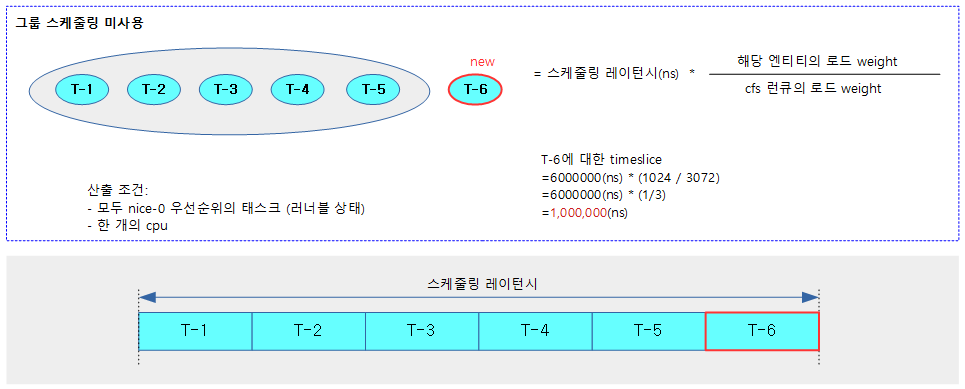
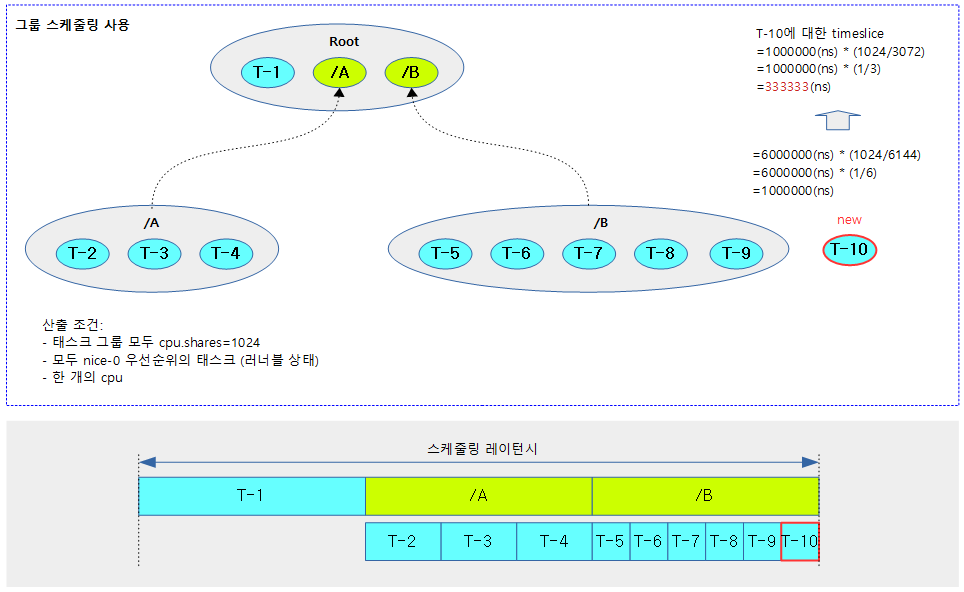
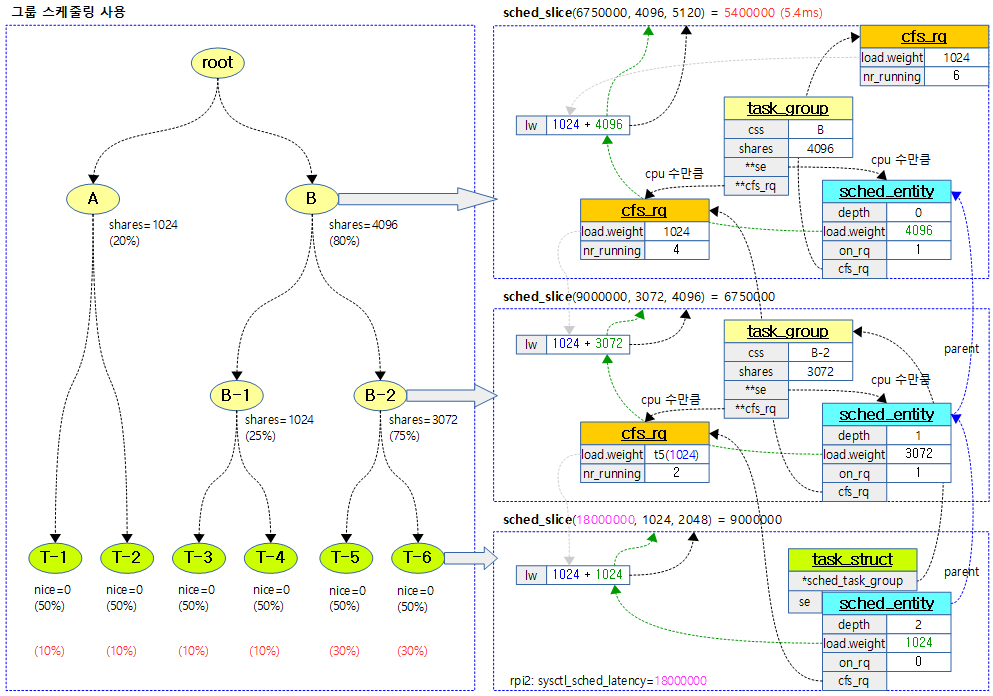
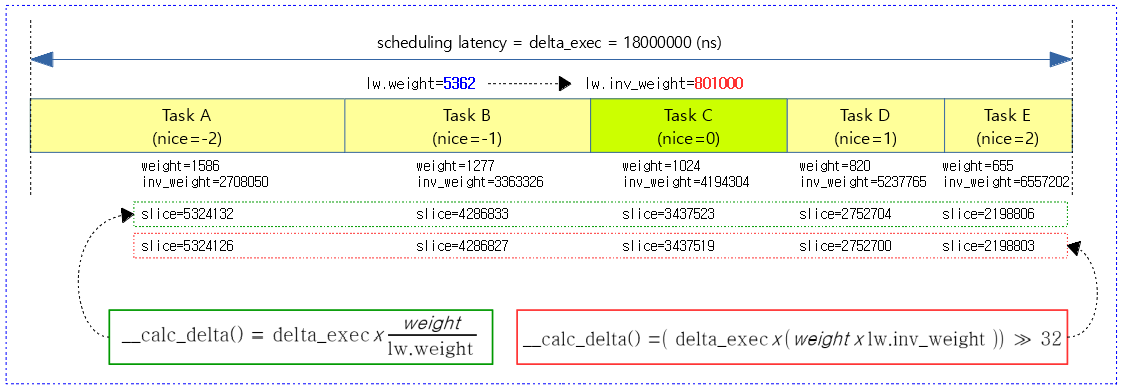
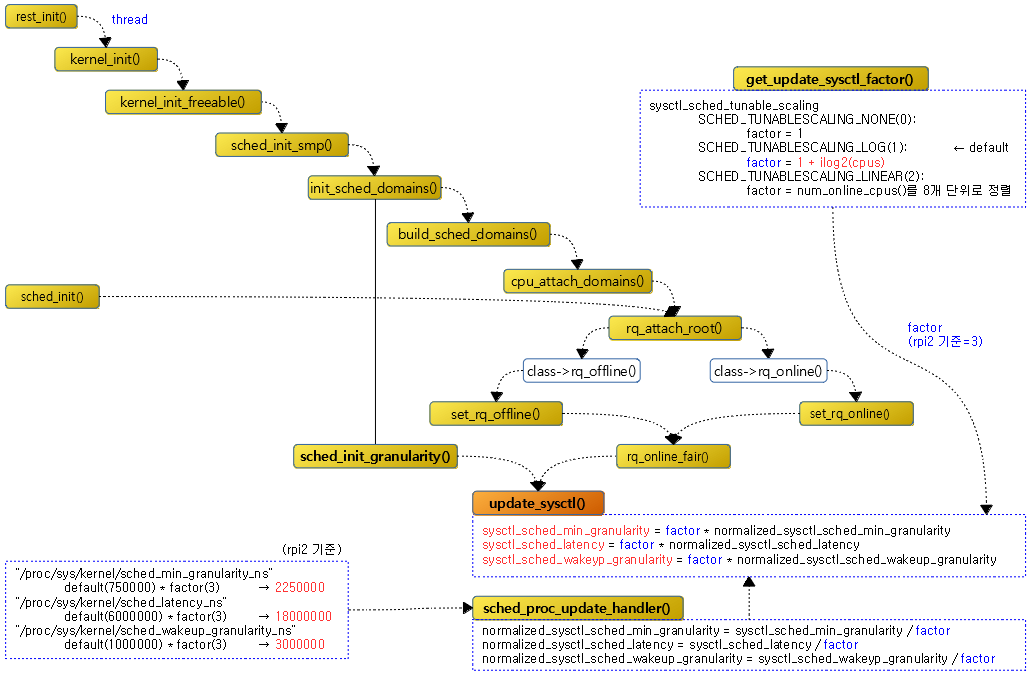


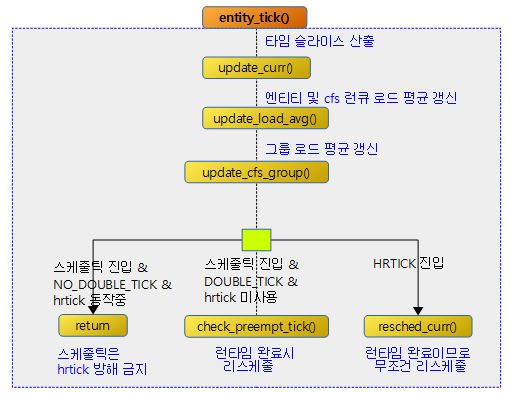
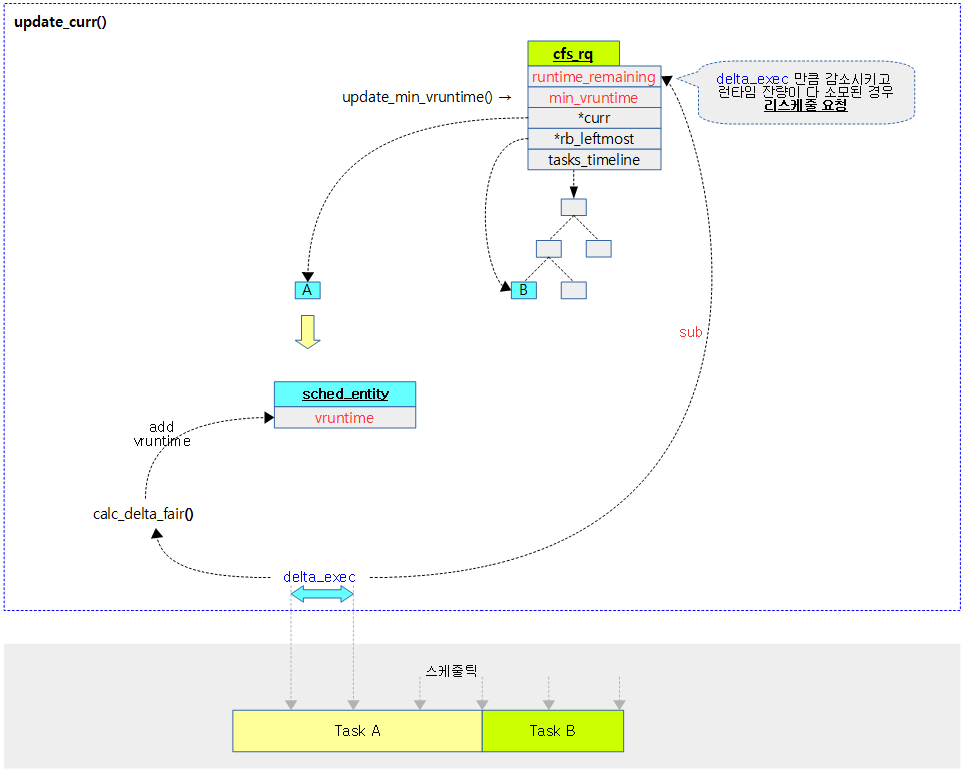
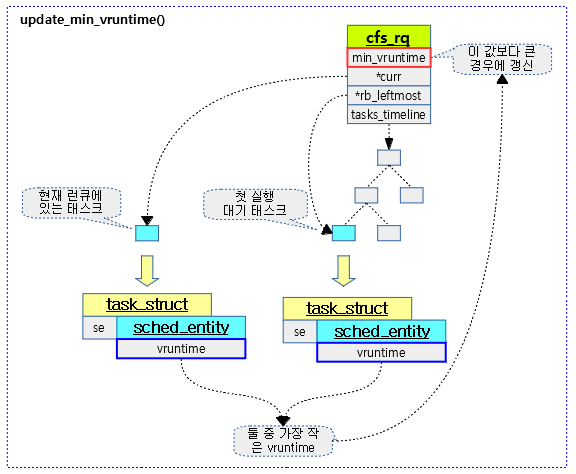
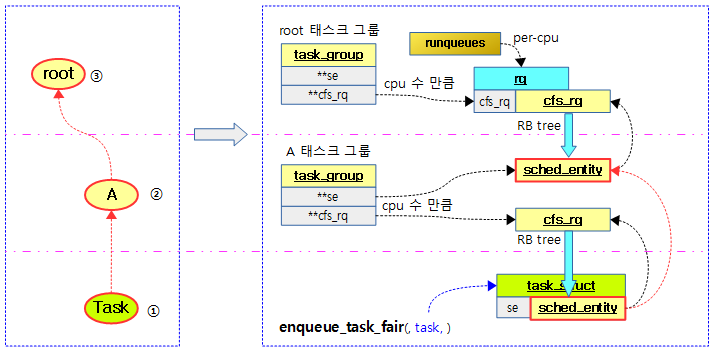

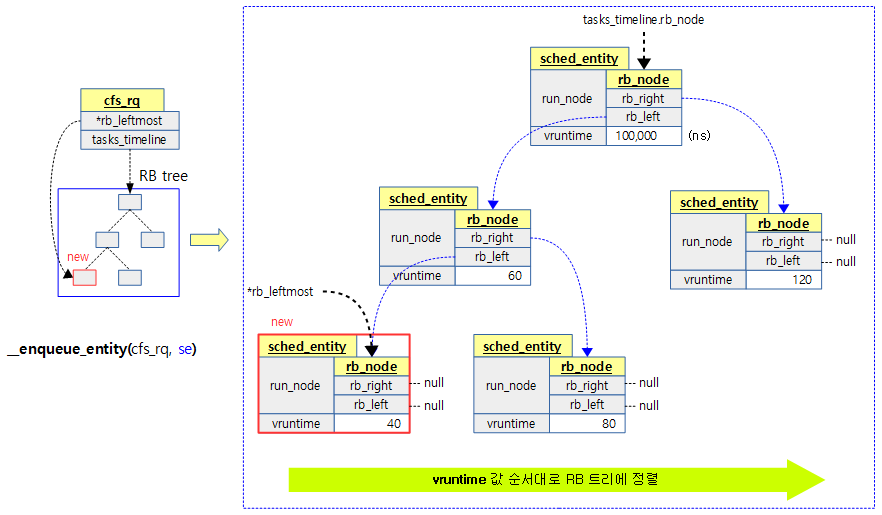
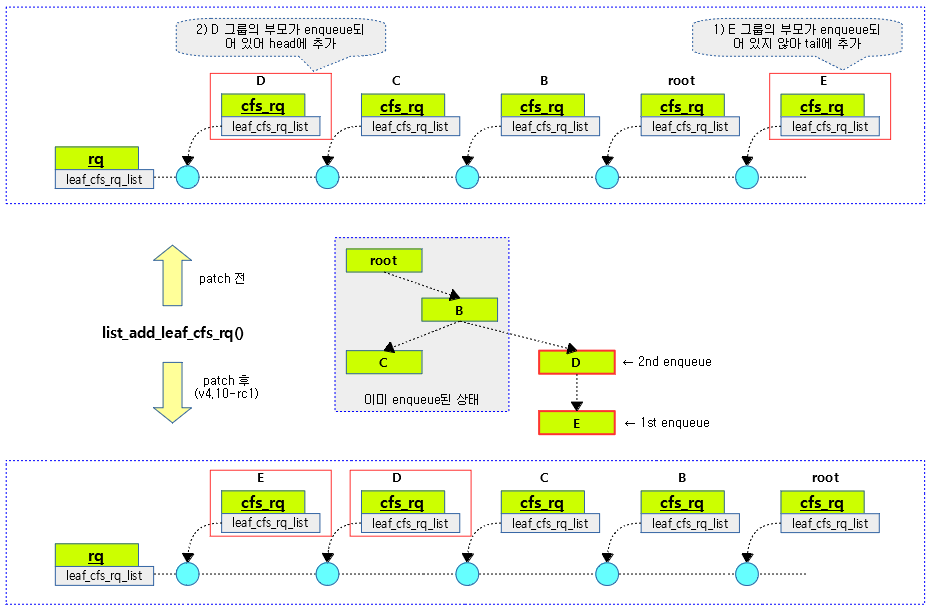
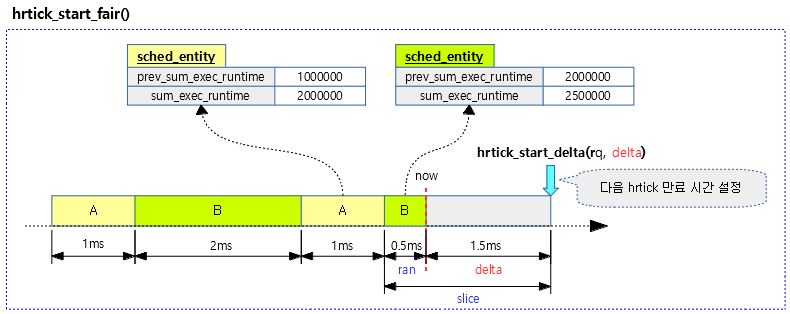
안녕하세요?
문득 궁금증이 생겨서 질문드립니다.
update_curr 함수내에서
실행시간을 계산할때 아래처럼 음수에 대한 체크를 하는데
실행시간이 음수가 나올수가 있는건가요..?
의미가 없는 코드가 아닌가 싶어 여쭙습니다..
delta_exec = now – curr->exec_start;
if (unlikely((s64)delta_exec <= 0))
return;
아래 경로에 가면 해당 패치의 이력을 확인할 수 있습니다.
https://lore.kernel.org/patchwork/patch/422077/
좋은 답변 달아 주셔서 감사합니다. ^^
다시 활동을 하시니 천만다행입니다.
종종 다른 개발자분들에게 도움이 될만한 부분이 확인되면 ‘문c블로그’에 Contribution하겠습니다.
감사합니다.
네. 2 개월씩이나 구멍을 내어 민망합니다. ^^;
종종 잘 부탁드립니다.
안녕하세요?
보통 커널은 1초에 수십~1000번 정도 틱을 받고, 이 때마다 태스크의 시간 사용량을 update 합니다.
때문에 이렇게 정상적인 경우에는 음수가 나올 일이 없습니다.
그러나 특수한 상황에서 음수가 나올 수 있는 경우가 있어 패치하였다고 합니다.
영문 패치 내용은 아래 AUSTIN KIM님께서 알려주신 url을 찾아가면 됩니다.
조금 쉽게 말씀 드리면 하나의 태스크만을 로드 밸런싱 없이 계속 고성능으로 돌리며,
틱 등의 인터럽트 마저도 멈추고 성능 이득을 얻으려할 때,
CONFIG_NO_HZ_FULL 사용되는 옵션을 사용하는데,
이 경우 장시간 동안 틱을 발생시키지 않아 태스크의 시간 사용량을 update하지 못하는 경우가 있습니다.
따라서 32비트 시스템에서 나노초 단위로 동작 시 수초~수십초면 32비트 카운터가 overflow되어 음수가 발생하는 상황이 발생할 수 있습니다.
감사합니다.
안녕하세요 글보고 질문이 있어서 덧글을 남깁니다.
pick_next_task() 함수를 이용하여 새로운 CLASS 를 추가 하려고 하는데요
FAIR 클래스 의 런큐에서 점유중인 테스크가 없다면 새로운 CLASS를 지정하려고 합니다.
그런데 계속 pick_next_task()를 순회하는 코드부분에서 에러가 발생합니다 –…
어떤 이유에서 오류가 발생하는지 알 수 있을까요..?
안녕하세요?
조금 막막한 상황이군요. 아래 내용도 체크해보시기 바랍니다.
– 새 태스크에 대한 priority 배치는?
– 새 클래스에서 idle 클래스로 갈수 있는 상황이 있어야 합니다.
감사합니다.
task_fork_fair() 함수에 대해서 질문 드립니다.
cfs_rq = task_cfs_rq(current);
curr = cfs_rq->curr;
if (curr) {
update_curr(cfs_rq);
se->vruntime = curr->vruntime;
}
이때 current != curr일 수 있는건가요?
그리고 fork를 하는 task == current 일때만 해당 코드가 수행이되니까 if(curr)는 항상 참이지 않을까 의문이 들었습니다.
안녕하세요?
위의 소스에서 current는 현재 cpu의 런큐에서 동작 중인 태스크(struct task_struct)이고,
curr는 위의 current 태스크가 소속된 cfs 런큐(cfs 스케줄러로 동작하는 런큐) 내에서의 cfs 스케줄 엔티티(struct sched_entity) 입니다.
따라서 current != curr가 됩니다.
일반적으로 부모 cfs 태스크(current)에서 fork한 자식 태스크 역시 policy가 상속되므로 자식 태스크도 cfs 태스크입니다.
그런데 rt 태스크에서 cfs policy(normal, ..)를 가진 태스크를 fork하여 생성하는 경우에는 current가 rt 태스크가 되므로 if 문을 벗어날 수도 있습니다.
감사합니다.
?
hello~,我是中国人,很高兴能看的你的文章,而且收益很大。想请教你一个问题,在rt任务中使用cfs策略什么场景下会存在?
Since the rt task operates only with rt priority, the cfs strategy that operates with the weight according to the priority cannot be used. Thank you.